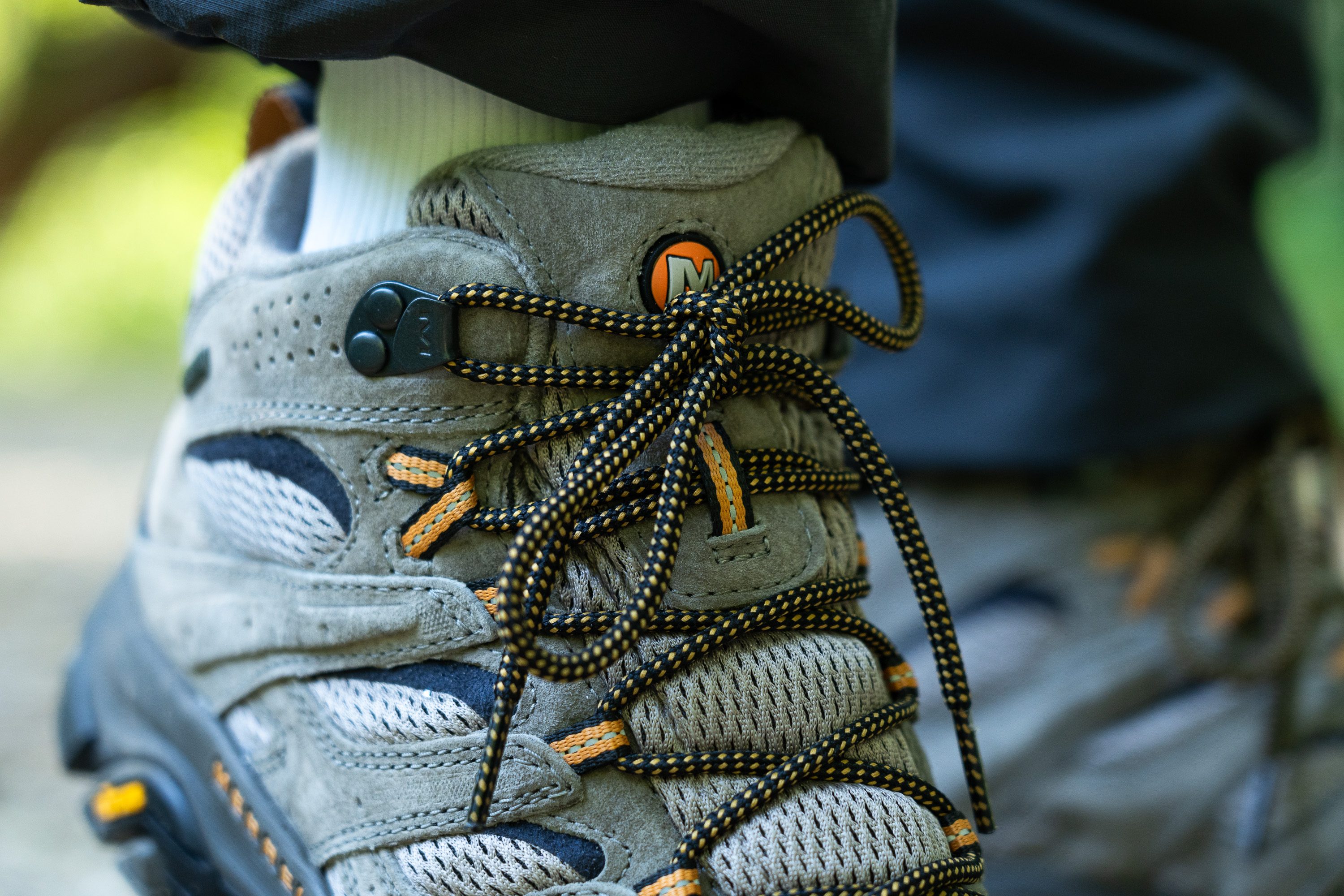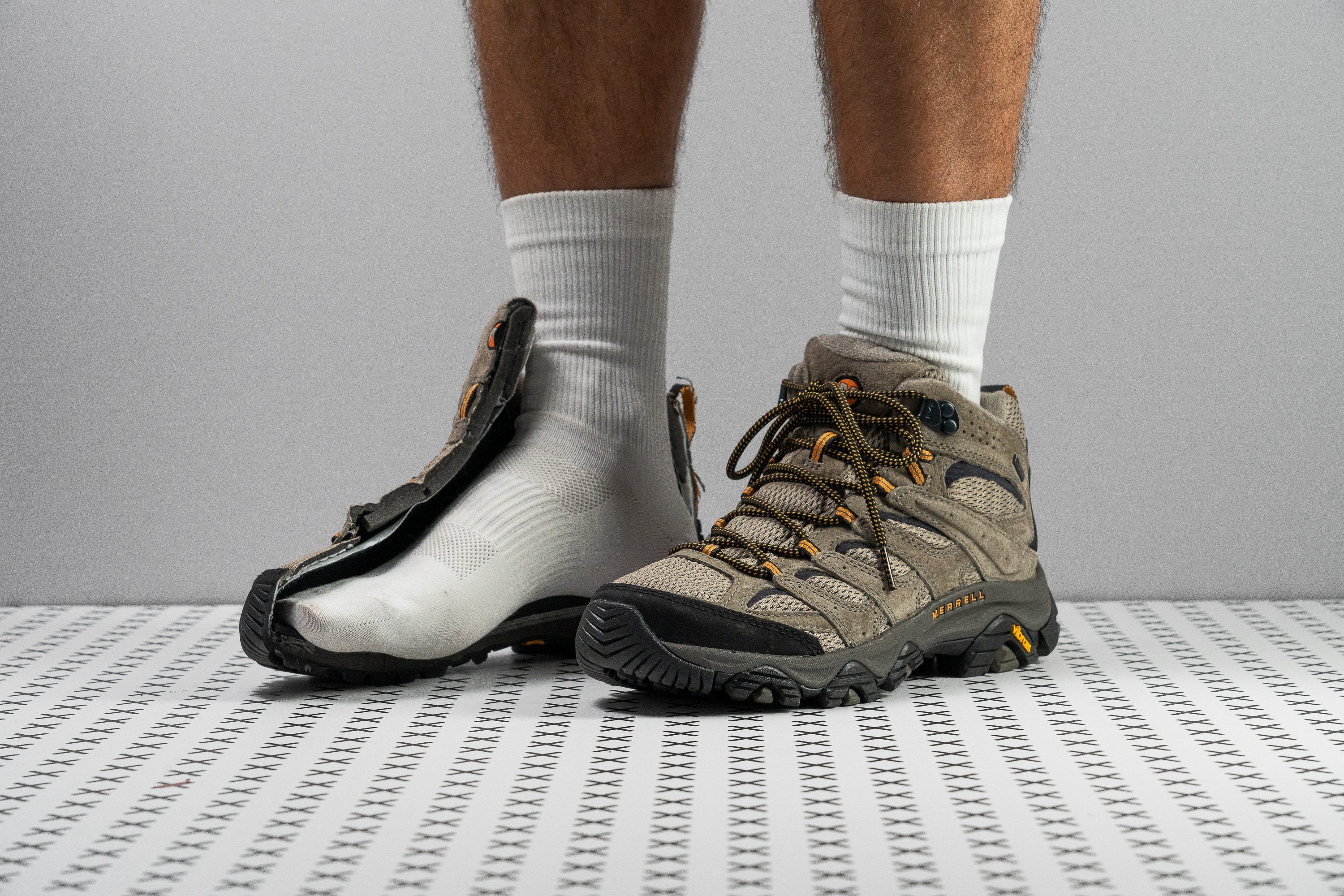Our verdict
- Top pick in best hiking boots
- Top pick in best winter hiking boots
Pros
- Best-in-class waterproofing
- Great stability for moderate hikes
- Supportive for all-day wear
- Comfortable step-in feel
- Excellent grip on hard terrain
- Secure lockdown
- Sturdy construction
- Sturdy construction
Cons
- Moderate impact protection
- Mesh panels are easy to tear
- Not for mud or soft terrain
- Moderate impact protection
Audience verdict
- Top 27% most popular hiking boots
Comparison
The most similar hiking boots compared
+ + Add a shoe | |||||
|---|---|---|---|---|---|
| Audience score | 83 Good! | 89 Great! | 79 Decent! | 85 Great! | |
| Price | £150 | £200 | £160 | £170 | |
| Trail terrain | Moderate | LightModerate | LightModerate | Moderate | |
| Shock absorption | Moderate | Low | High | - | |
| Energy return | Moderate | Low | Moderate | - | |
| Weight lab Weight brand | 17.5 oz / 495g 13.6 oz / 385g | 17 oz / 482g 17 oz / 482g | 17.4 oz / 494g 18 oz / 510g | 18.2 oz / 515g 17.4 oz / 493g | |
| Lightweight | ✓ | ✓ | ✓ | ✗ | |
| Breathability | Warm | Warm | Warm | Warm | |
| Use | Day HikingLight HikingSnow | Day HikingLight HikingUrban hiking | Day HikingSpeed HikingLight HikingSnow | BackpackingDay HikingLight Hiking | |
| Orthotic friendly | ✓ | ✓ | ✓ | ✓ | |
| Drop lab | 13.5 mm | 13.5 mm | 9.0 mm | 12.9 mm | |
| Size | Half size small | True to size | True to size | True to size | |
| Midsole softness | Firm | Firm | Balanced | Firm | |
| Difference in midsole softness in cold | Small | Small | Normal | Small | |
| Heel counter stiffness | Moderate | Stiff | Flexible | Flexible | |
| Stiffness | Moderate | Moderate | Moderate | Moderate | |
| Outsole hardness | Average | Very hard | Average | Soft | |
| Waterproofing | Waterproof | Waterproof | Waterproof | Waterproof | |
| Material | MeshSuede | Suede | LeatherTextile | Leather | |
| Season | Winter | Winter | Winter | Winter | |
| Toebox durability | Bad | Decent | Bad | Good | |
| Heel padding durability | Good | Decent | Bad | Decent | |
| Outsole durability | Bad | Decent | Decent | Bad | |
| Width / fit | Medium | Medium | Medium | Wide | |
| Toebox width | Medium | Medium | Narrow | Wide | |
| Lug depth | 5.0 mm | 3.7 mm | 5.0 mm | 4.2 mm | |
| Heel stack lab | 36.1 mm | 32.7 mm | 34.4 mm | 31.1 mm | |
| Forefoot | 22.6 mm | 19.2 mm | 25.4 mm | 18.2 mm | |
| Widths available | NormalWide | Normal | NormalWide | NormalWide | |
| Technology | Gore-Tex | Ortholite | Gore-TexVibram | Ortholite | |
| Cut | Mid cut | Mid cut | Mid cut | Mid cut | |
| Removable insole | ✓ | ✓ | ✓ | ✓ | |
| Ranking | #30 Bottom 26% | #8 Top 20% | #38 Bottom 7% | #24 Bottom 41% | |
| Popularity | #11 Top 27% | #29 Bottom 29% | #12 Top 30% | #30 Bottom 26% |
Who should buy
In our opinion, it's hard to go wrong with the Merrell Moab 3 Mid GTX if you are after the following:
- a solid boot for hiking moderate terrain with an average-sized pack
- a comfort-loaded boot with enough support for all-day wear
- a mid-cut boot with world-class Gore-Tex waterproofing (ready for ankle-deep creeks and puddles)
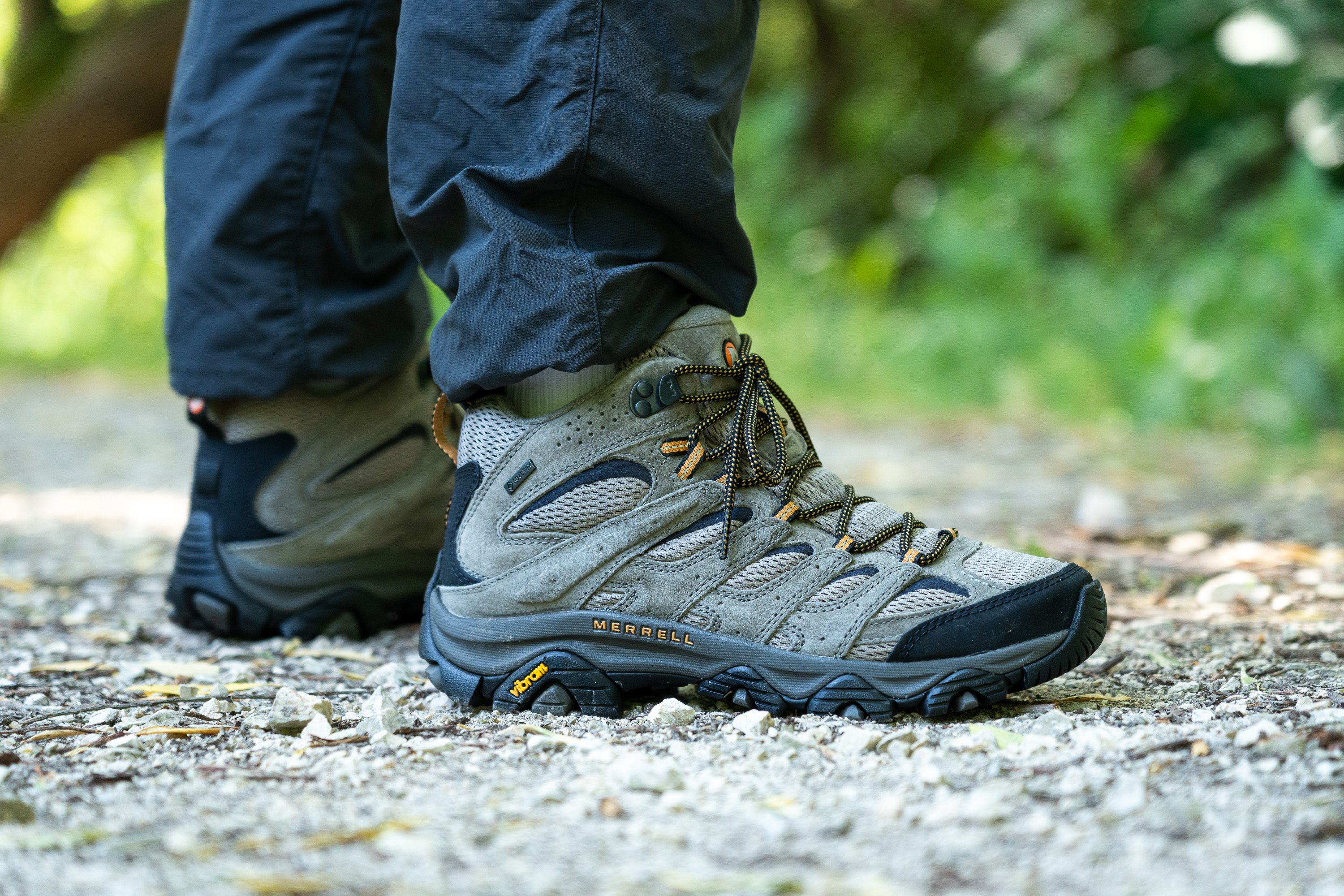
Who should NOT buy
The Moab 3 Mid GTX is a fantastic all-purpose boot but it has its limitations when the hiker's demands get more specific.
If you want all the support and stability a mid-cut boot can provide (for backpacking especially), consider the Salomon X Ultra 4 Mid GTX instead. It is one of the sturdiest boots in the same price range and has better grip for technical and muddy terrain.
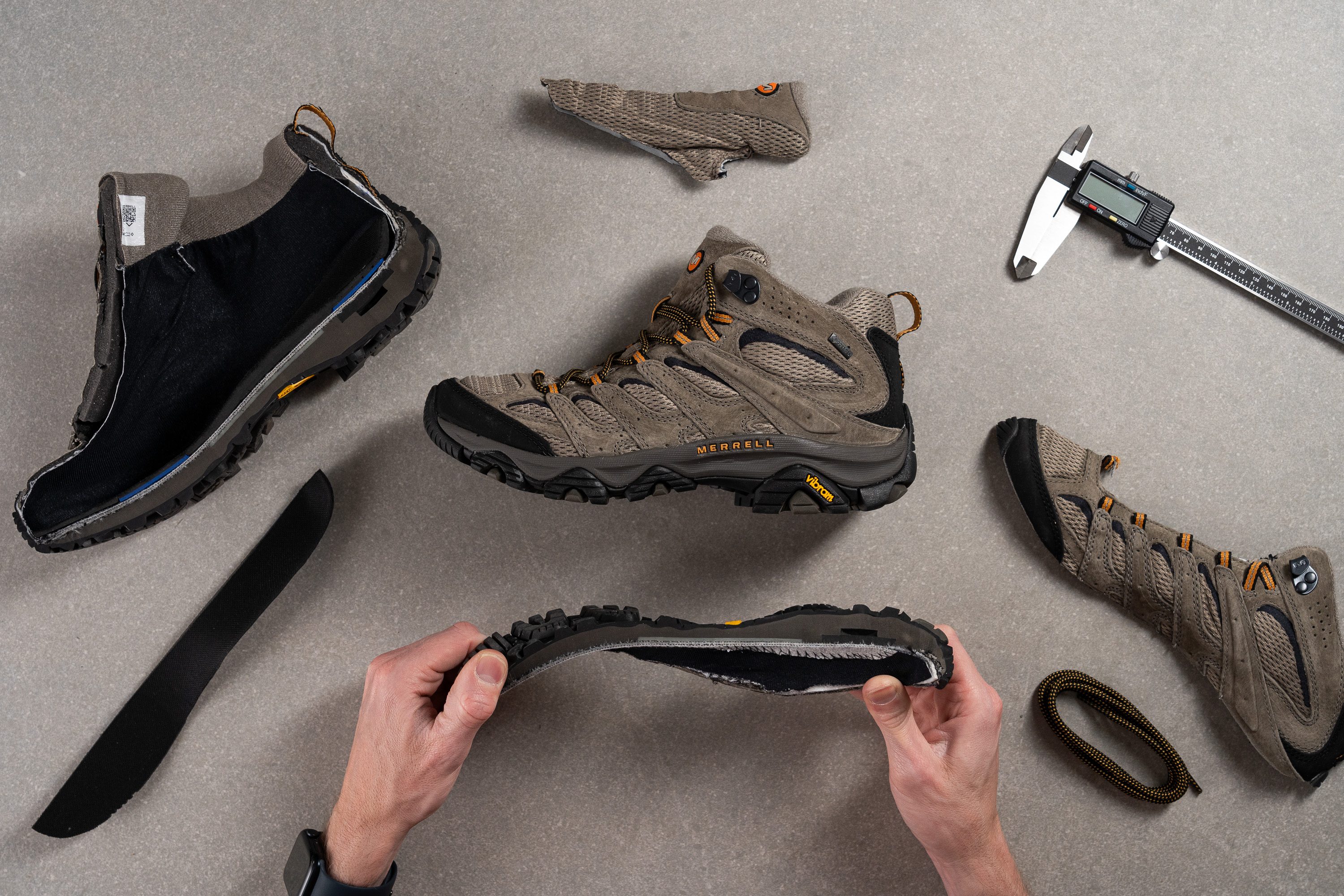
If you want a nimbler companion for lighter and speedier hikes (with a lighter pack), look into the Merrell Moab Speed Mid GTX.
And if you want all the benefits of the Moab 3 Mid GTX minus the high collar, the low-top Moab 3 GTX shoe is always available too! And it's £20 cheaper.
Cushioning
Despite its seemingly chunky build, the Merrell Moab 3 Mid GTX has failry average platform dimensions.
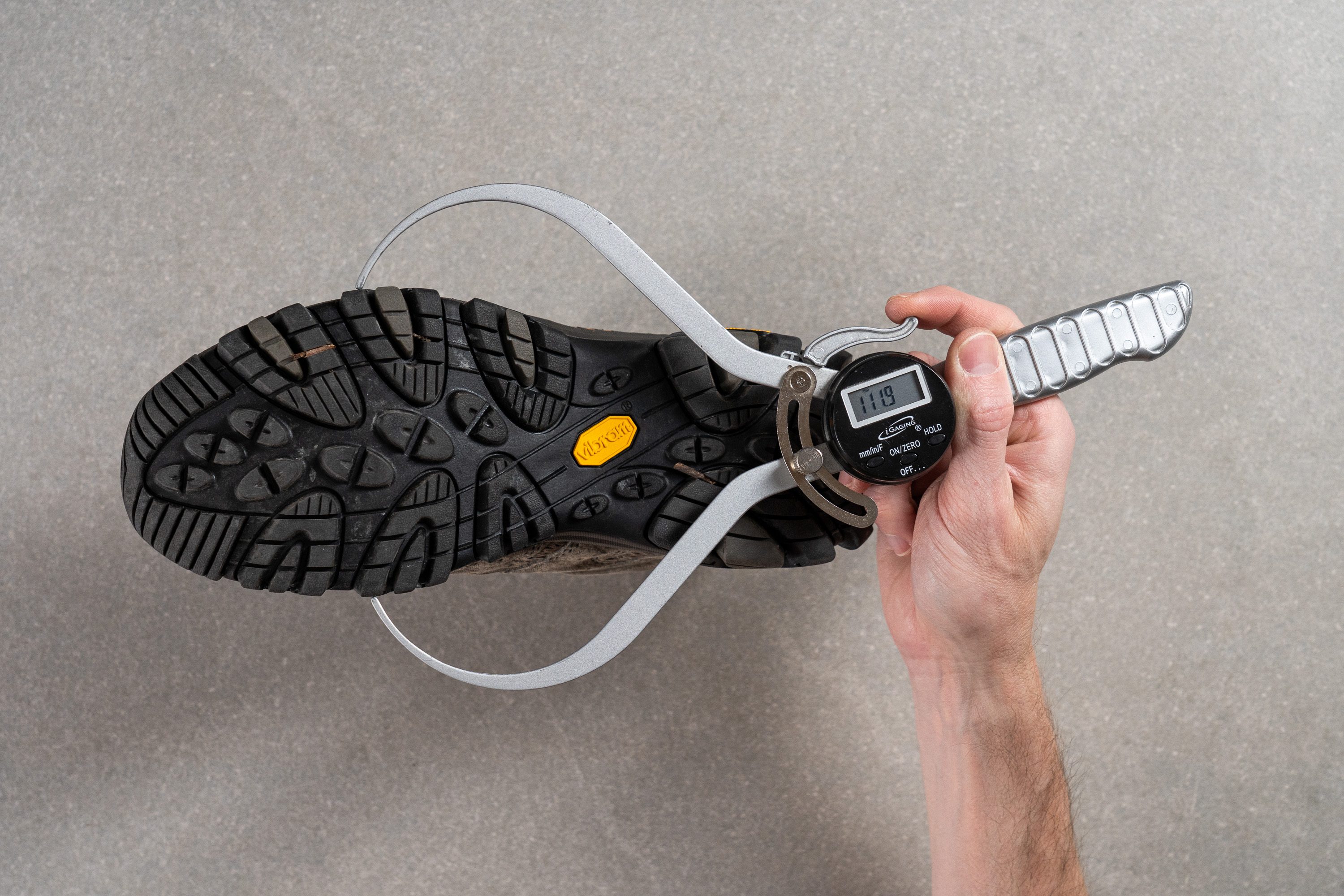
Measuring the shoe's midsole in the widest area of the forefoot, we got nothing more than the average reading of 111.9 mm.
Shock absorption
Even though the Moab 3 Mid GTX feels cosy and padded upon the first step, we found that it falls short of the cushioning and impact protection needed for long hikes with a heavy load.
Its below-average shock absorption of 88 SA doesn't provide as much comfort as some of the other hiking boots with a similar stack height.
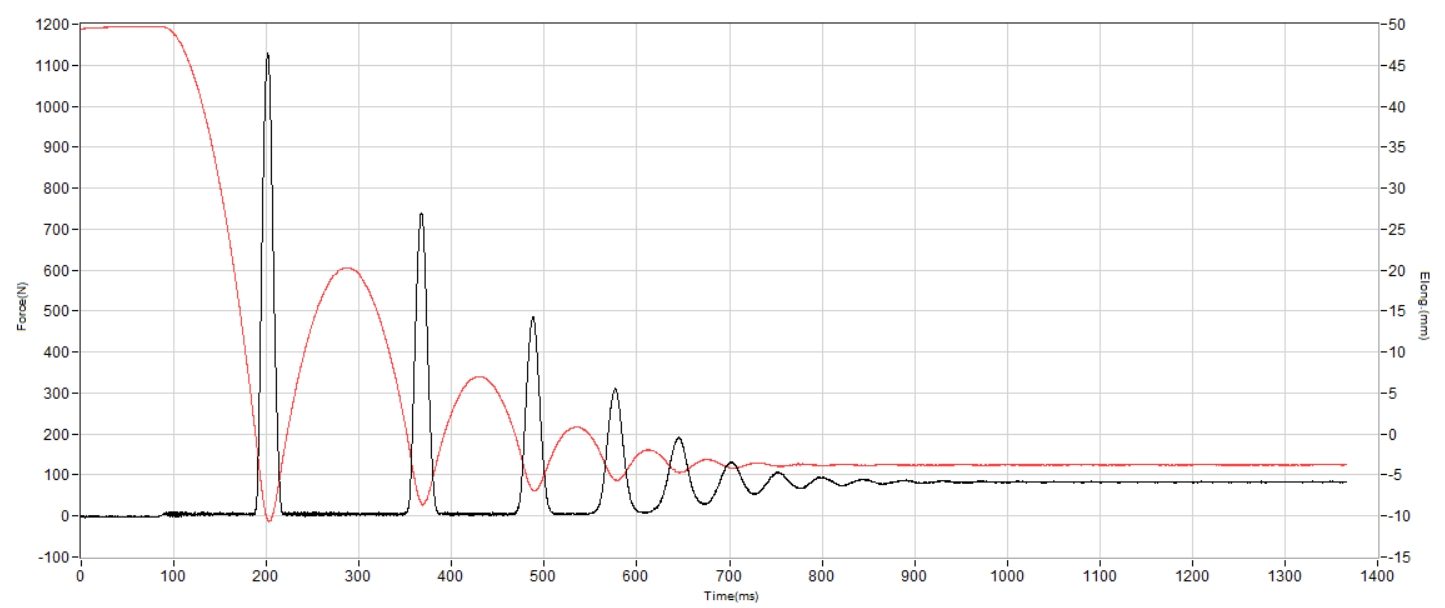
| Moab 3 Mid GTX | 88 SA |
| Average | 93 SA |
Energy return
The ride of this Merrell boot doesn't feel particularly responsive either. With a moderate energy return of 47.8%, it feels muted but grounded.
| Moab 3 Mid GTX | 47.8% |
| Average | 50.5% |
Heel stack
Measuring the heel stack of this Merrell boot, we got a reading of 36.1 mm on our calliper.
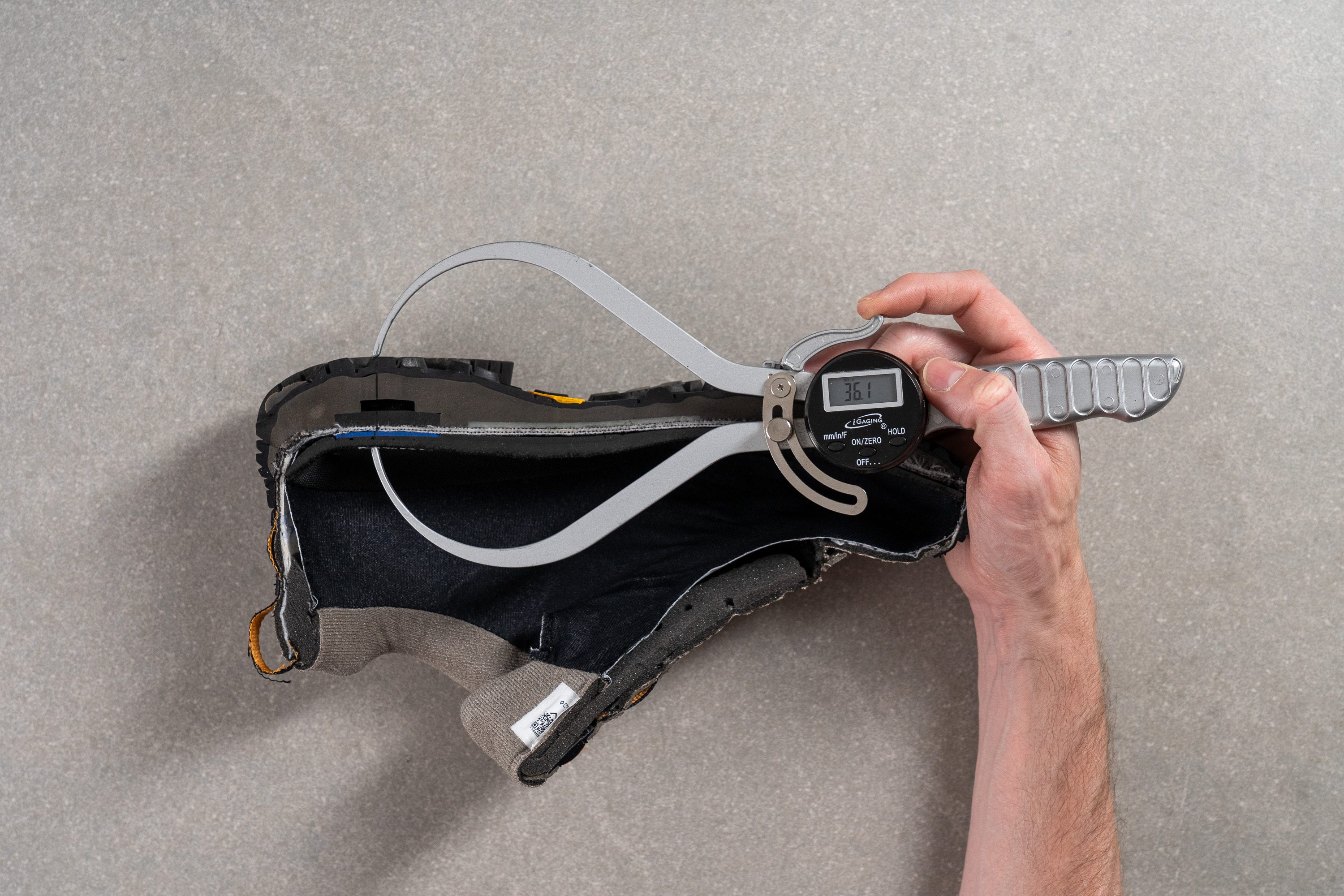
It is notably taller than the KEEN Targhee III Waterproof Mid (31.1 mm) and is on par with the Hoka Anacapa Mid GTX (36.7 mm).
| Moab 3 Mid GTX | 36.1 mm |
| Average | 36.3 mm |
Forefoot stack
The Moab Mid 3 GTX doesn't skimp on forefoot protection either.
There is 22.6 mm of sole material separating the ball of your foot from the trail. It is an average forefoot stack reading for hiking boots but we found that it does a great job muting out rocks and roots underfoot.
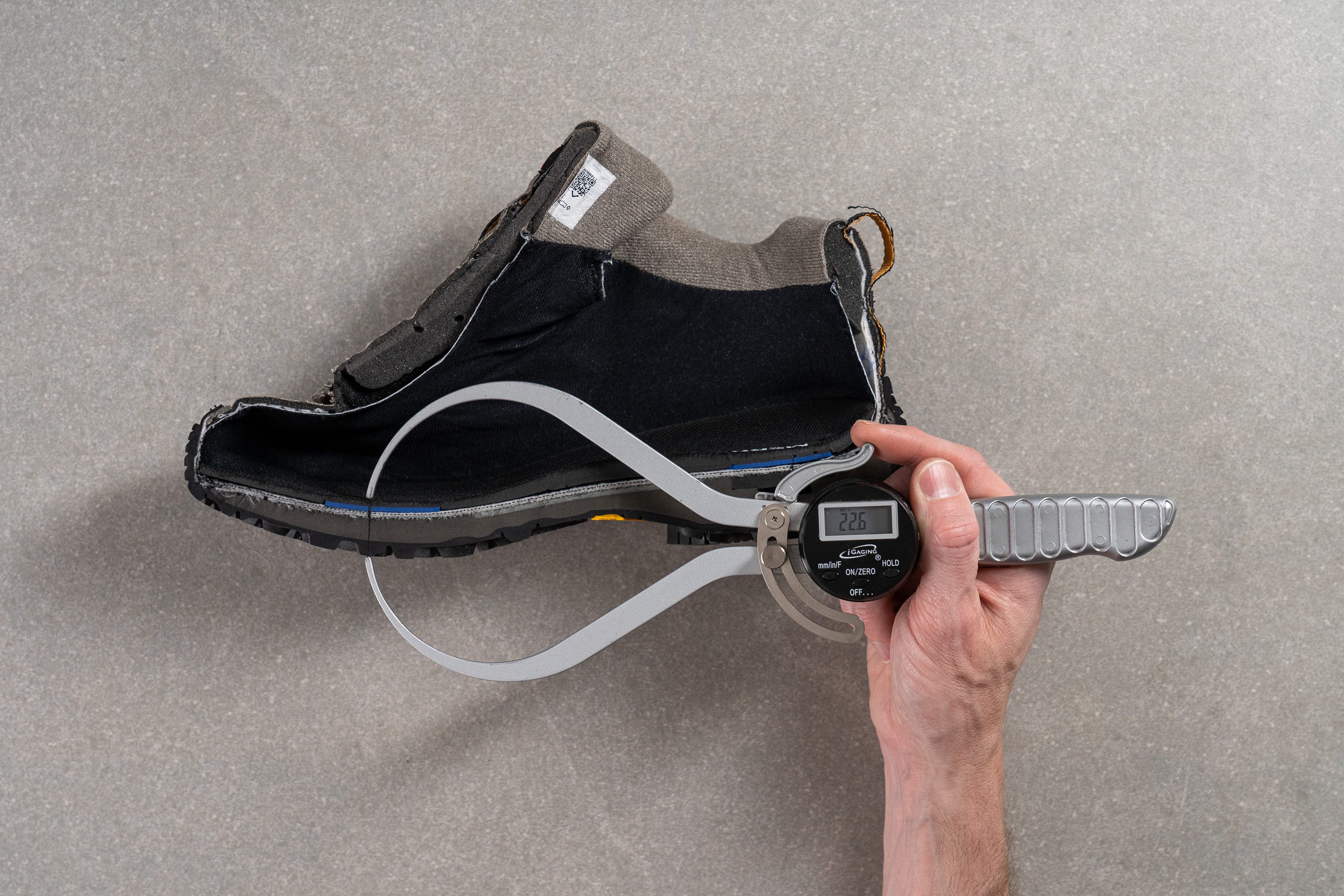
| Moab 3 Mid GTX | 22.6 mm |
| Average | 23.0 mm |
Drop
In its official specs, Merrell lists 11.5 mm as the boot's heel-to-toe drop. However, our lab stack measurements showed it to be slightly higher (13.5 mm).
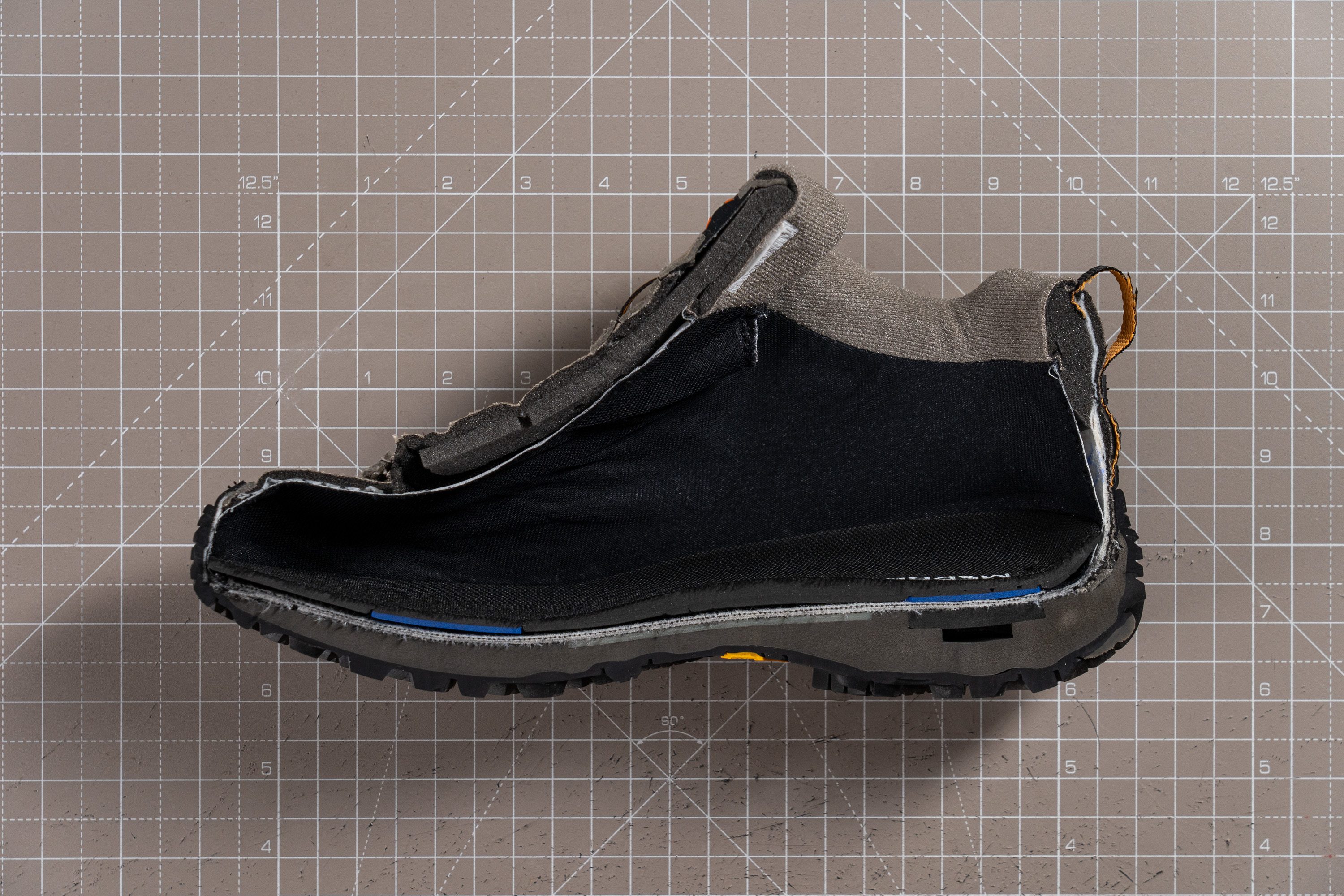
But in reality, the two offsets feel quite similar, especially if you are new to hiking.
A heel-to-toe drop within the 10-14 mm range is optimal for entry-level hikers as it elevates the heel above the toes just enough to take the pressure off the Achilles, especially when a heavier load is involved.
| Moab 3 Mid GTX | 13.5 mm |
| Average | 13.3 mm |
Midsole softness
The Moab 3 Mid GTX feels nice and comfortable but its cushioning can't be categorised as plush.
Showing 32.8 HA on our Shore A durometer, the boot's midsole foam turns out to be 20% firmer than the average.
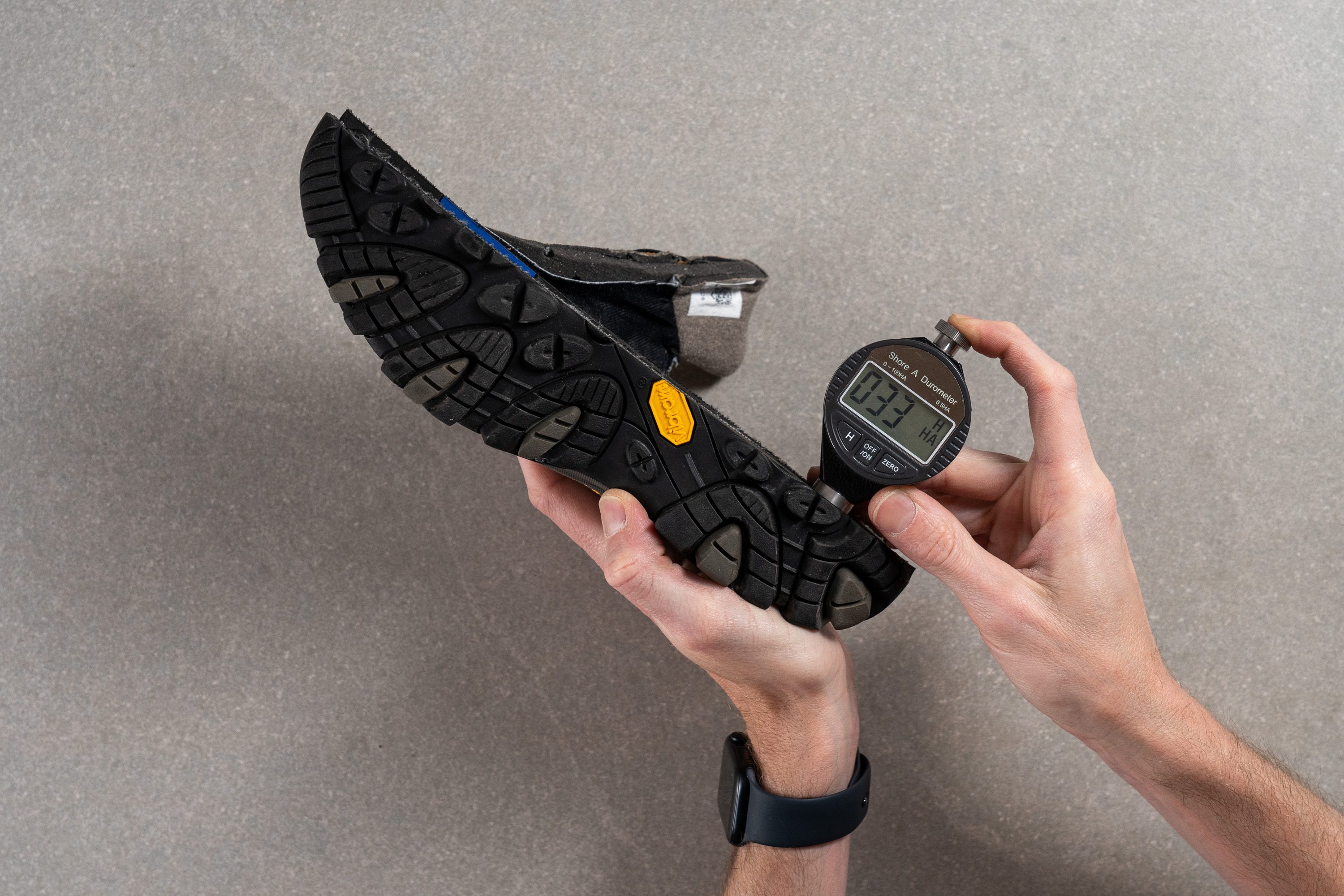
| Moab 3 Mid GTX | 32.8 HA |
| Average | 28.4 HA |
Secondary foam softness
However, it feels a little softer under the heel than the static reading might suggest. This is thanks to the Merrell Air Cushion technology which is comprised of a softer piece of foam (24.6 HA) and a hollowed-out section beneath it.
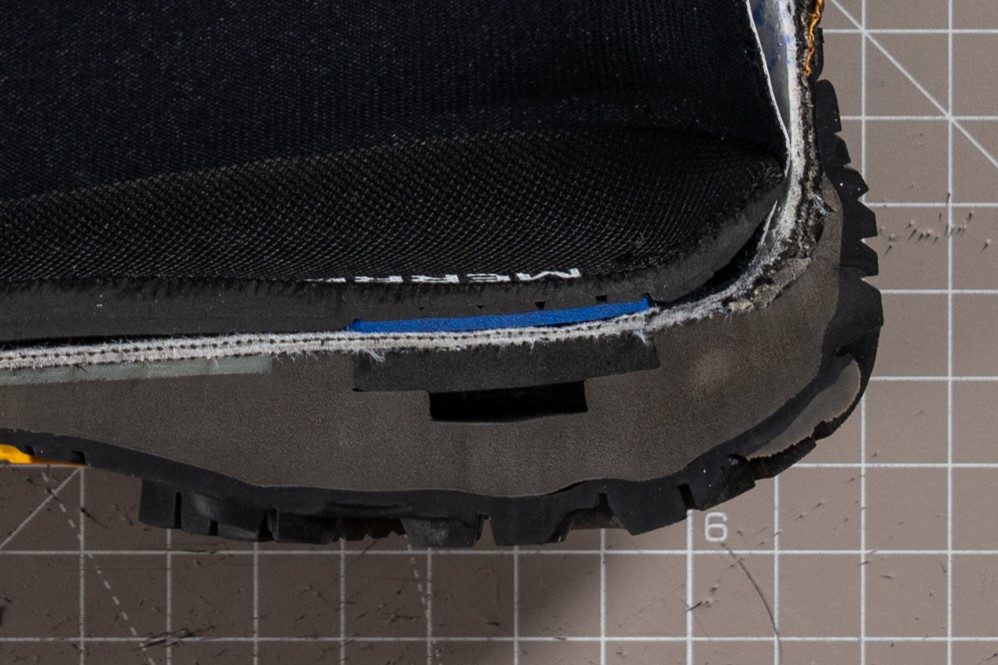
We found it to be a nice way to add some comfort to the ride without compromising the boot's firmness for stability.
| Moab 3 Mid GTX | 24.6 HA |
| Average | 42.7 HA |
Size and fit
Size
Merrell Moab 3 Mid GTX fits half size small (57 votes).
Consider sizing up
Internal length
| Moab 3 Mid GTX | 272.2 mm |
| Average | 271.4 mm |
Toebox width - widest part
Our medium-width feet were treated to a pretty accommodating toebox on the Moab 3 Mid GTX.
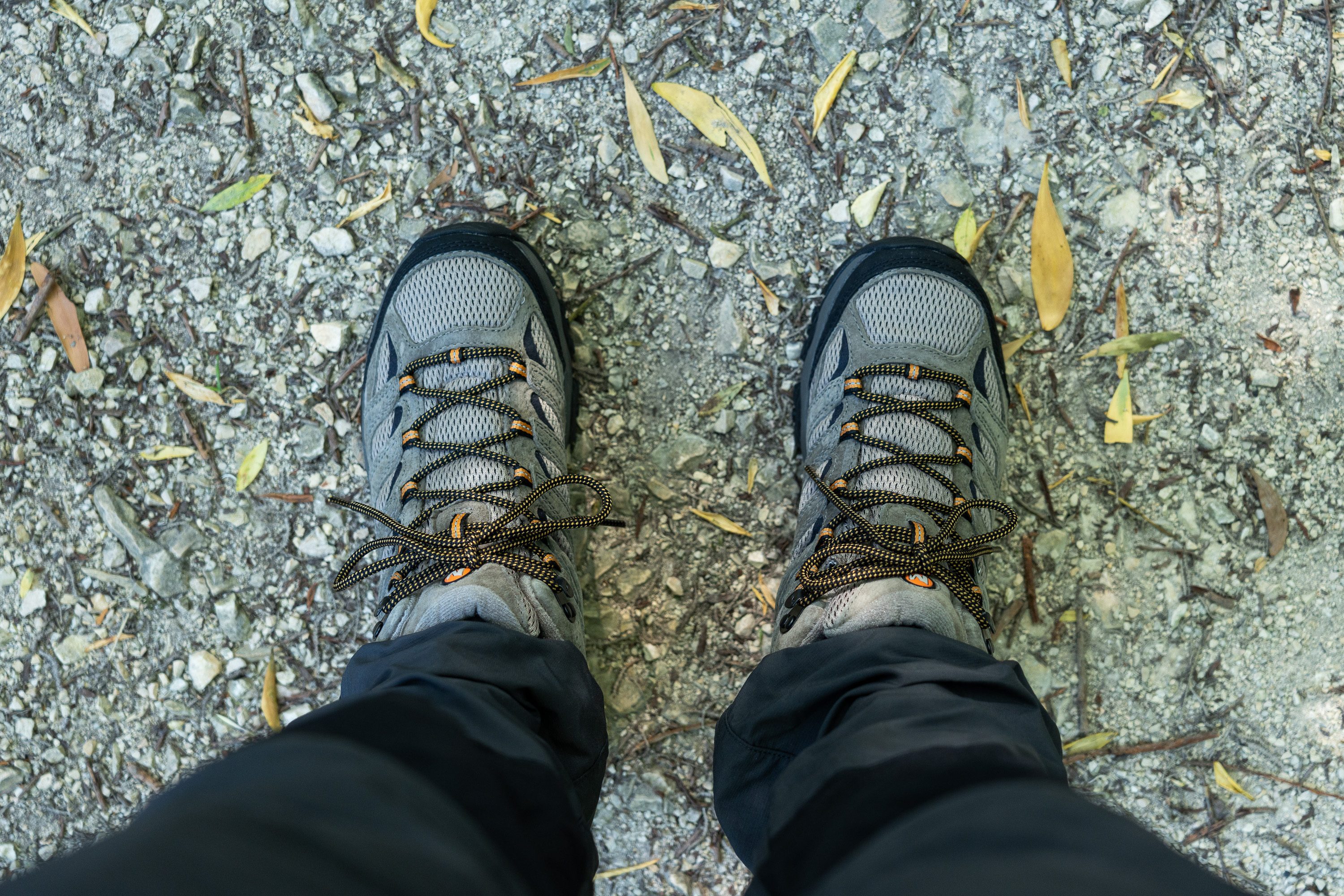
In our opinion, this Merrell boot will suit folks with medium and slightly wide feet perfectly. And our caliper is here to back that up.
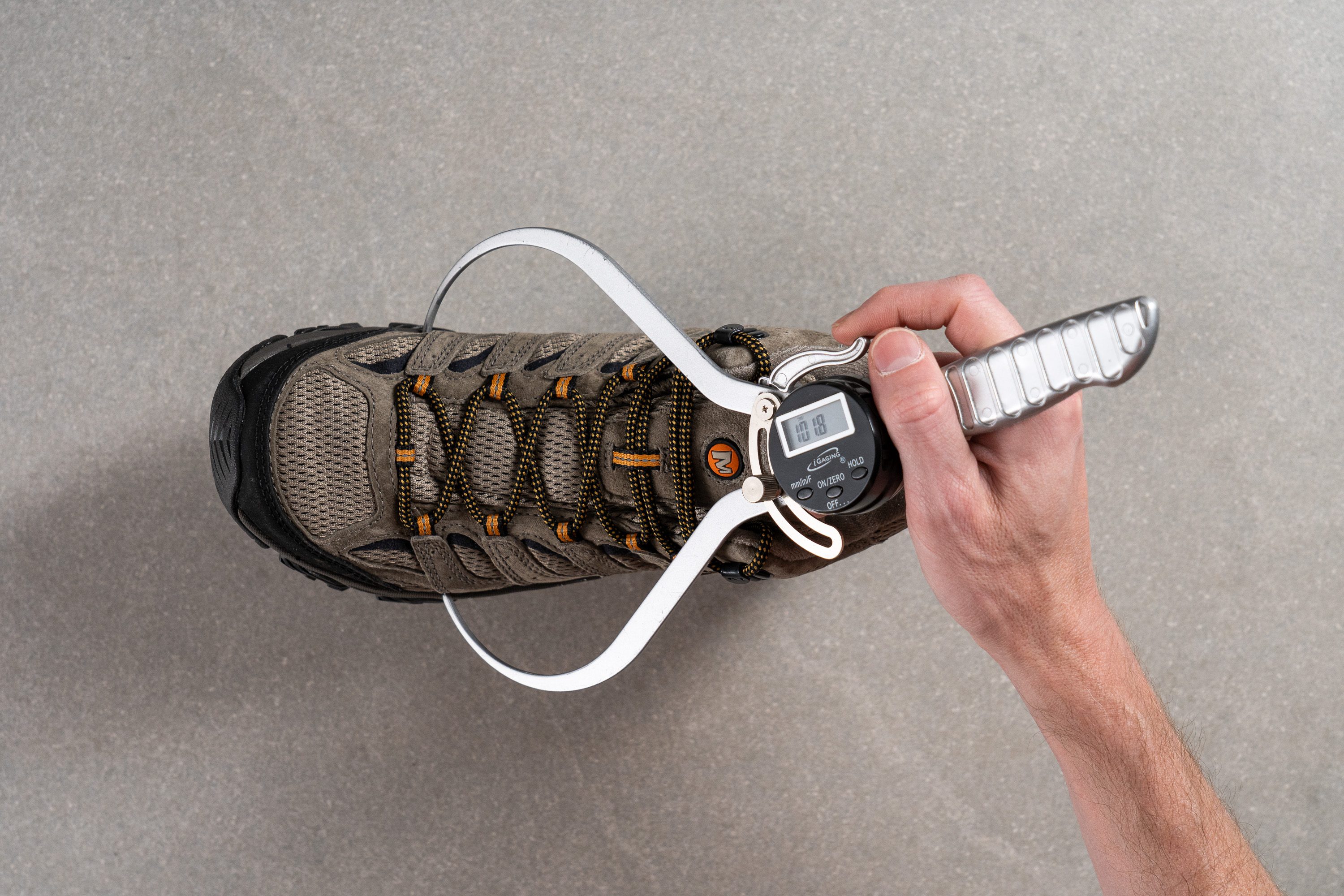
The widest part of the boot's toebox comes in at 101.8 mm which is on par with the average width for a US 9 size and D-medium width.
This test follows an older methodology, which is why you don't see recently tested shoes in the chart. Results from different methodologies can not be compared.
| Moab 3 Mid GTX | 101.8 mm |
| Average | 102.1 mm |
Toebox width - big toe
We also measured the boot's toebox in its narrower part (where the big toe ends) and got a slightly wider-than-average reading of 80.4 mm. A little bonus for swelling feet.
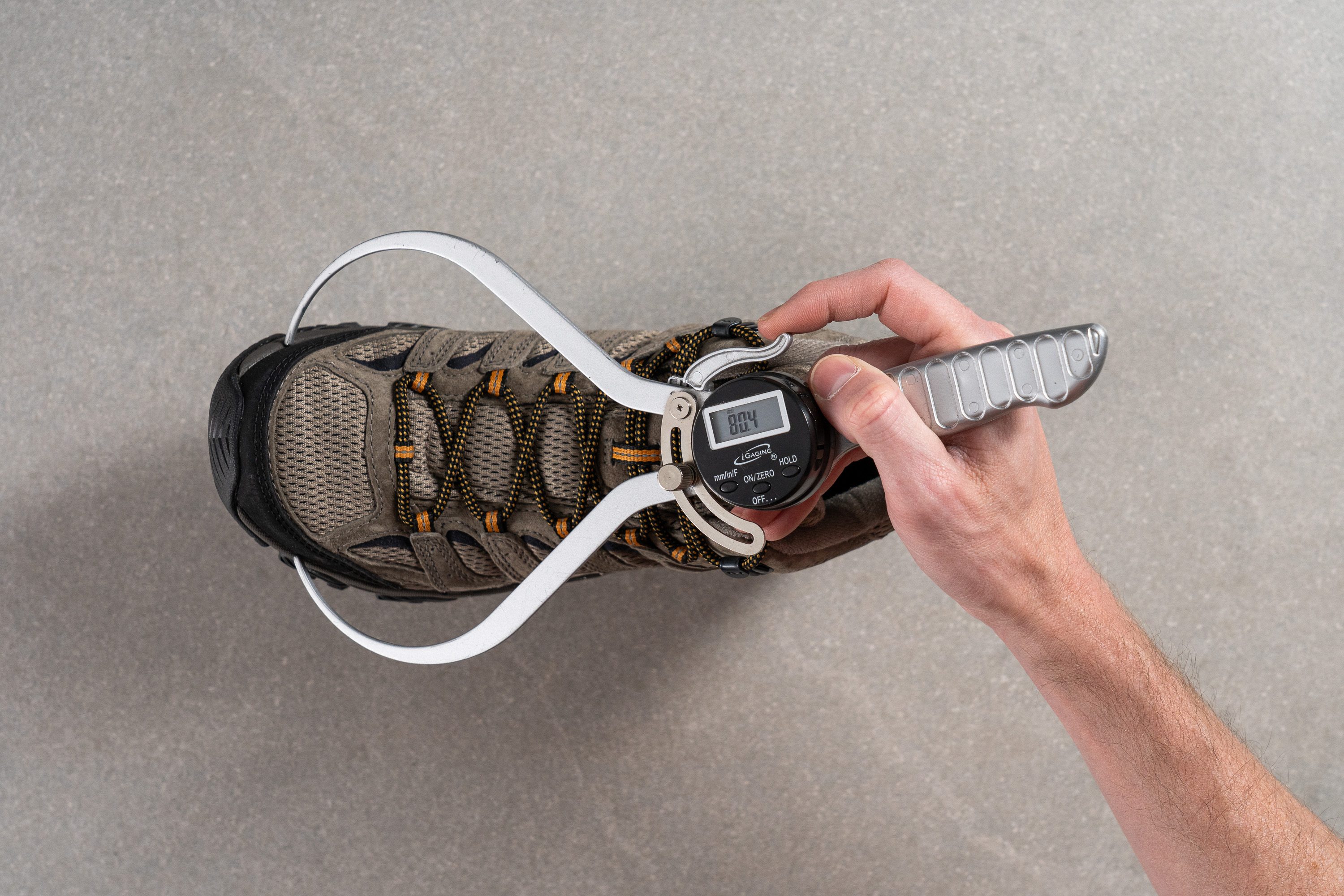
This test follows an older methodology, which is why you don't see recently tested shoes in the chart. Results from different methodologies can not be compared.
| Moab 3 Mid GTX | 80.4 mm |
| Average | 78.6 mm |
Traction / Grip
Lug depth
First of all, we are happy to report that our calliper measurements confirmed the brand specs - the boot's lug depth is precisely 5.0 mm!
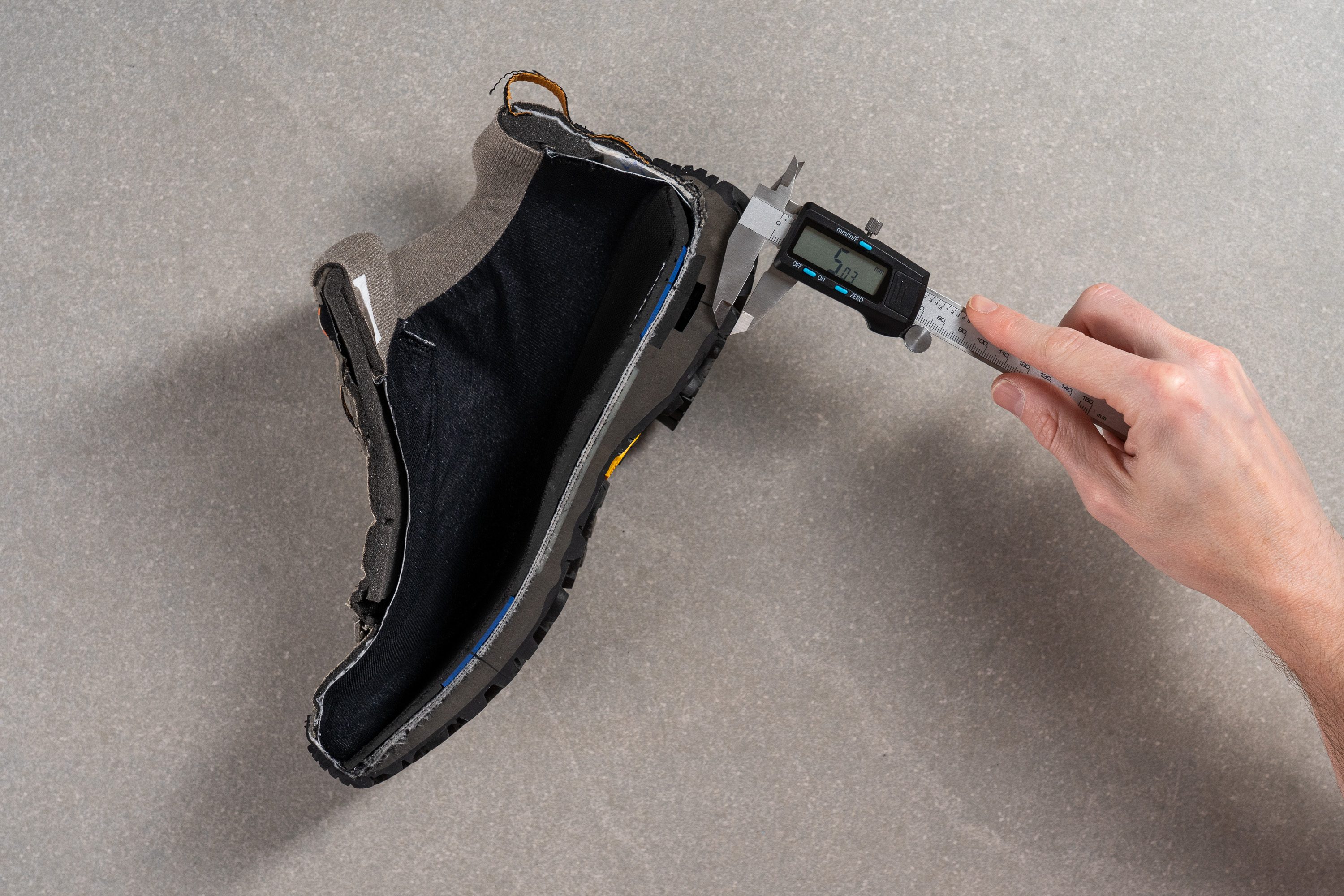
The grip offered by these deep treads and the Vibram TC5+ rubber did not falter during our wear tests.
The Moab 3 Mid GTX kept us surefooted as we navigated rocks and creeks and stepped on wet grass and mossy logs.
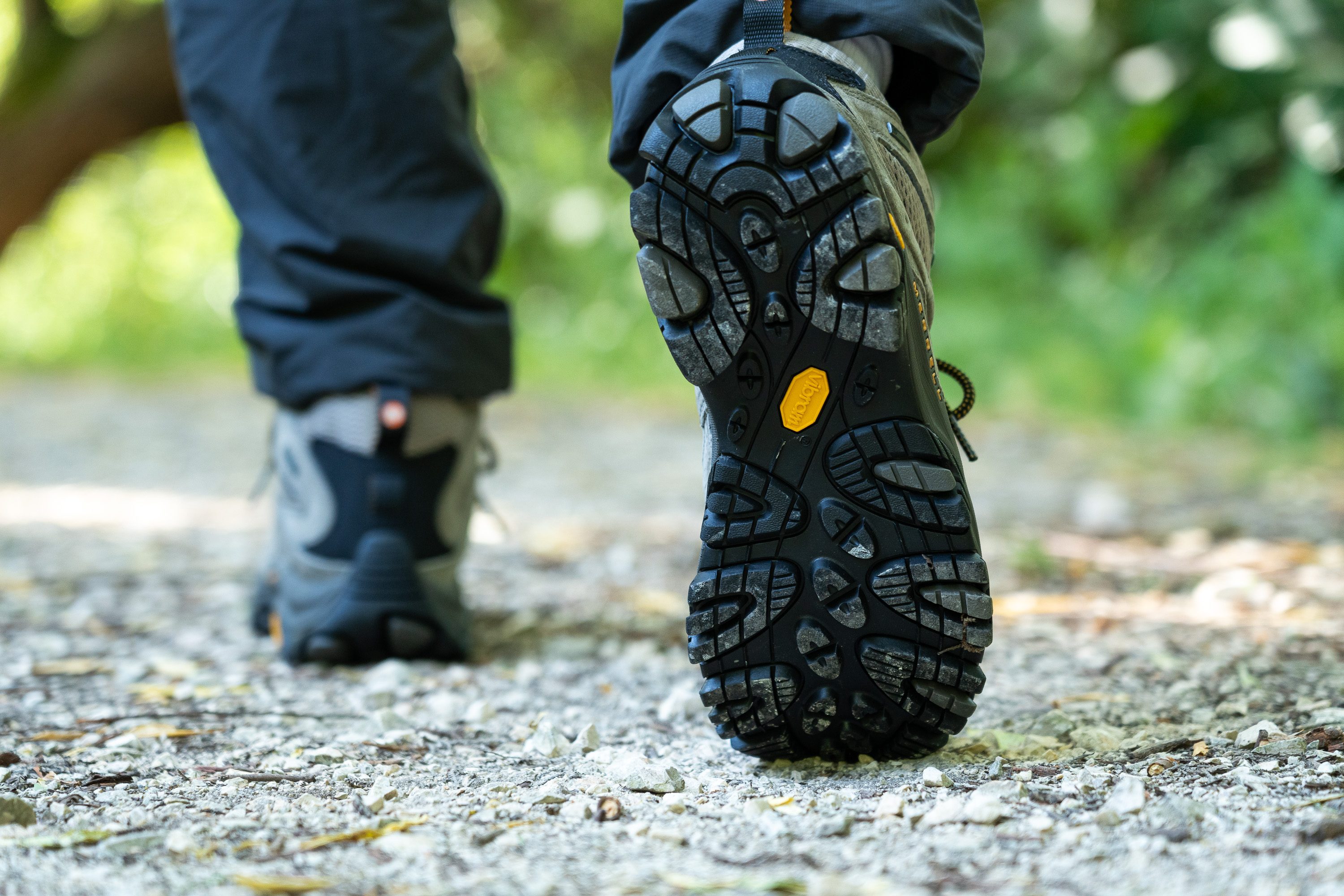
However, we wouldn't recommend this Merrell boot for squelching through mud and soft terrain. Even though its lugs are deep, they are not sharp and toothy enough for these conditions. The Salomon X Ultra 4 Mid GTX has a more aggressive treading for challenges like that.
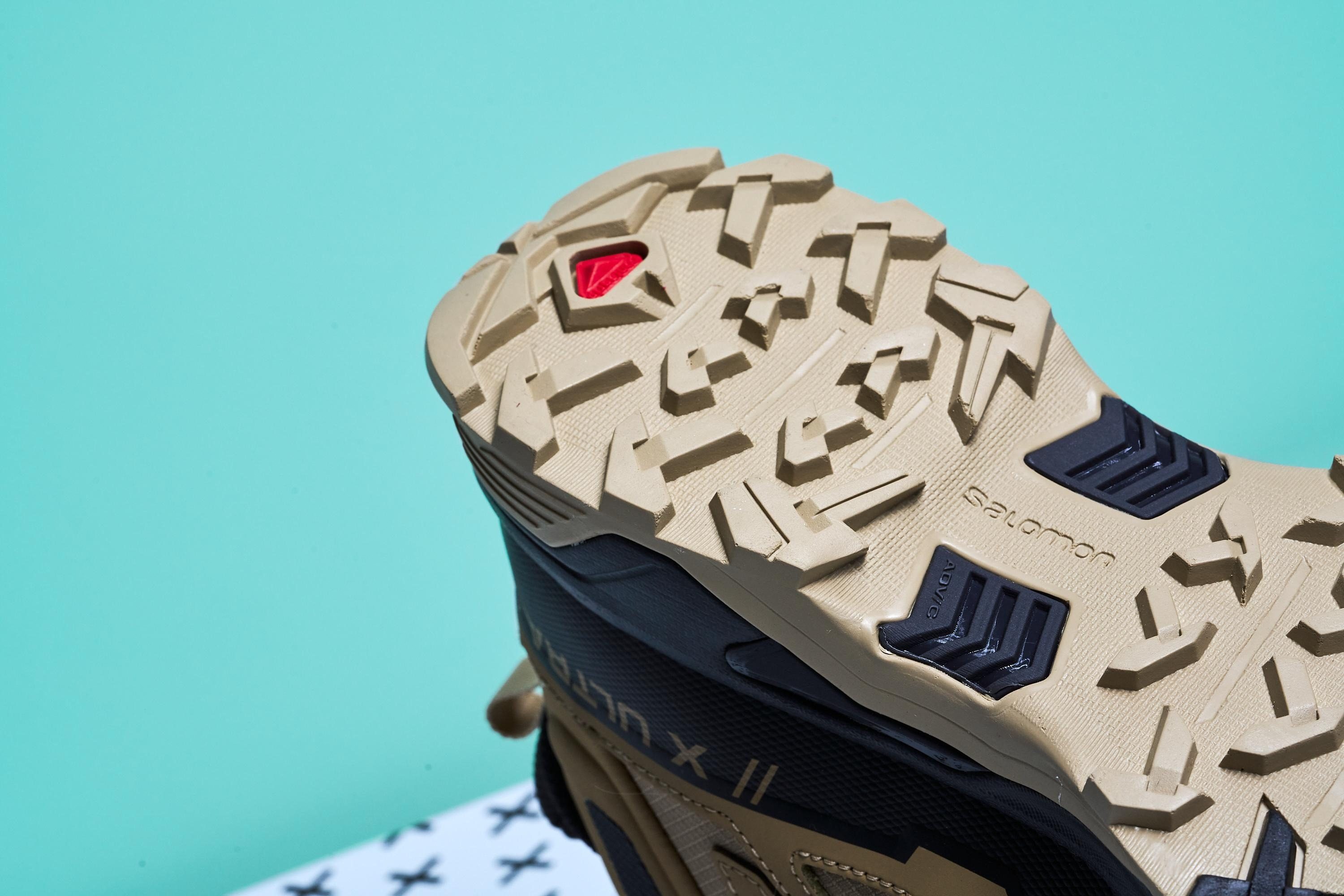
| Moab 3 Mid GTX | 5.0 mm |
| Average | 4.3 mm |
Flexibility / Stiffness
Even though the Merrell Moab 3 Mid GTX feels pretty rigid torsionally, we were surprised to find some flexibility in its forefoot.
Measuring how much force it takes to bend the shoe to a 30-degree angle, our flex testing machine showed a standard reading of 31.8N. That's just as much as it takes an average hiking boot!
One more bonus point for comfort.
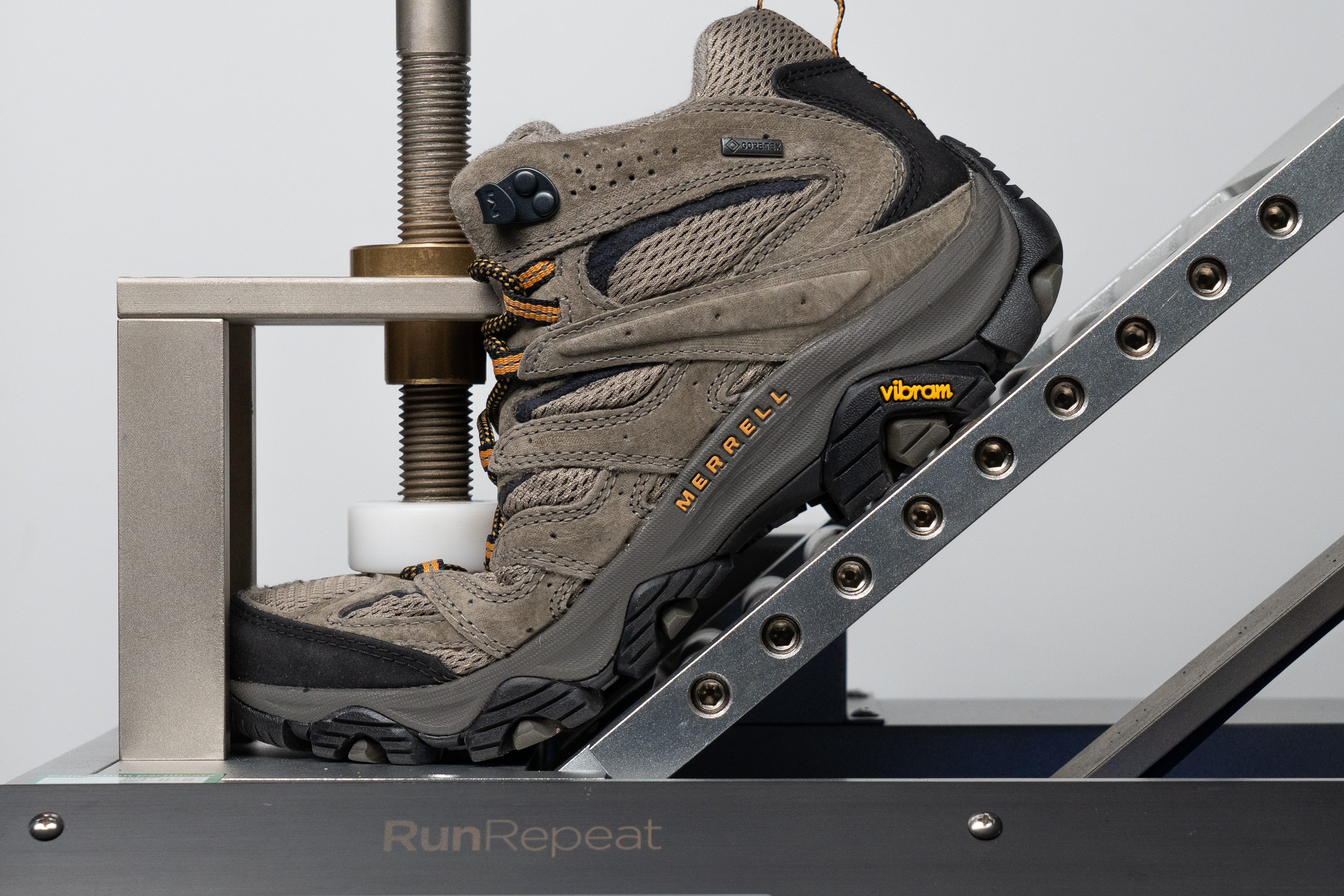
| Moab 3 Mid GTX | 31.8N |
| Average | 31.5N |
Stiffness in cold (%)
But do expect to lose about 25% of that flexibility in cold conditions.
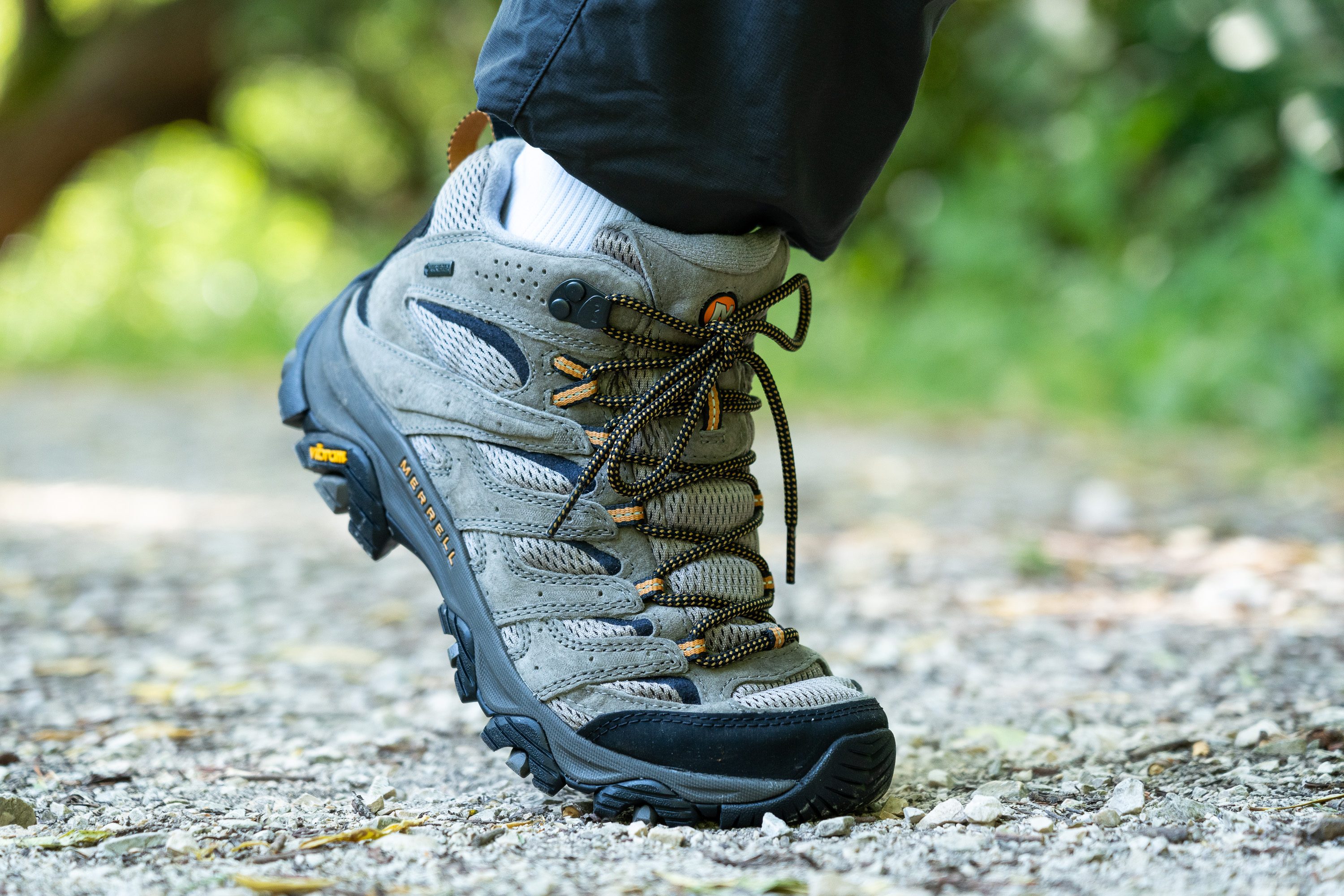
This is how much stiffer the Moab 3 Mid GTX got after we had kept it in the freezer for 20 minutes. But the good news is that this Merrell boot did not get nearly as stiff as most other hiking boots after the same test (54.0N).

| Moab 3 Mid GTX | 25% |
| Average | 24% |
Weight
Based on our personal experience, the Merrell Moab 3 Mid GTX doesn't feel particularly heavy but it does feel substantial on foot.
Tipping the scale at 17.5 oz (495g), it is even an ounce lighter than the average hiking boot in our lab.
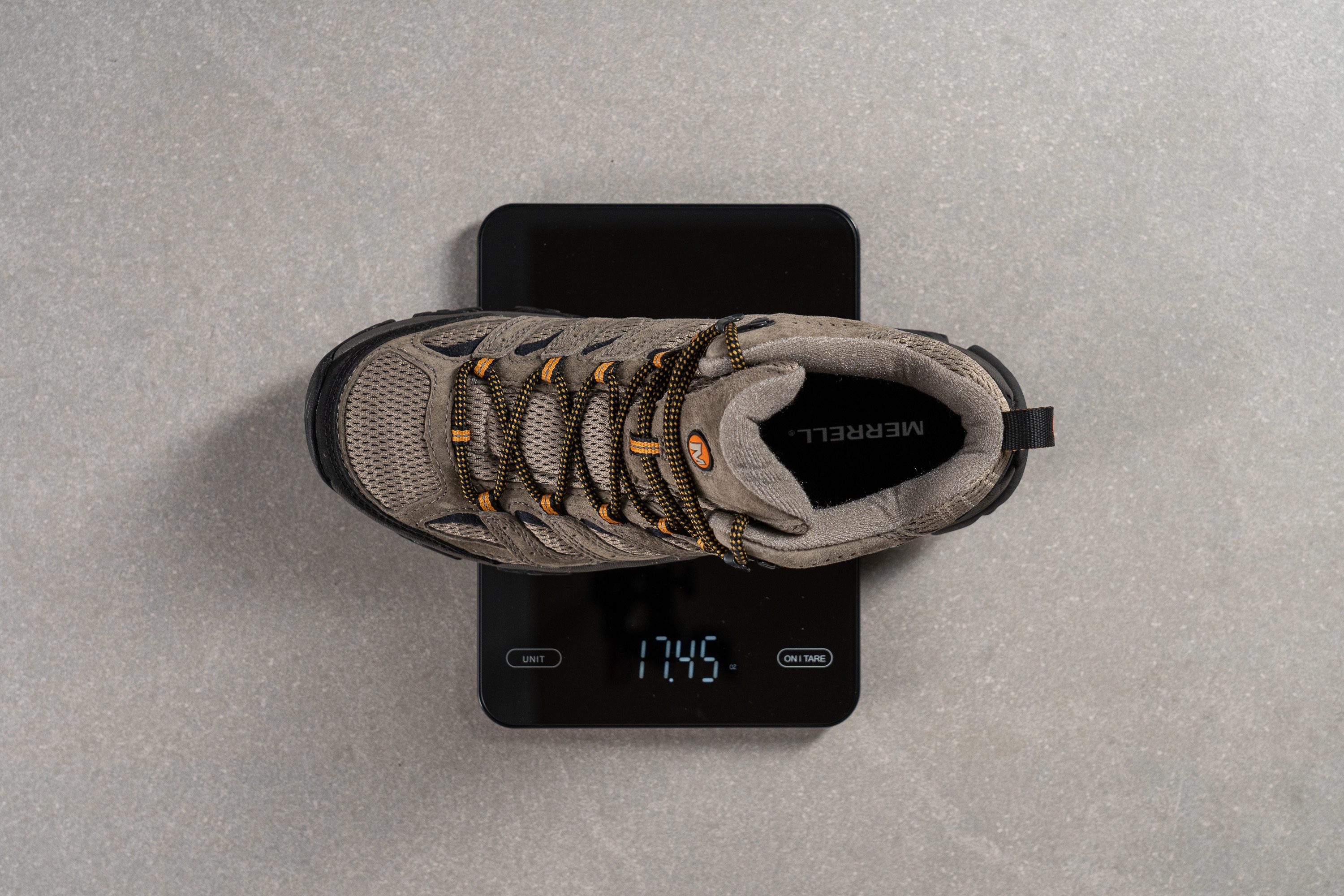
Compared to other mid-cut waterproof hiking boots in the same price range (£160-£180), the Moab 3 Mid GTX sits between the heavier KEEN Targhee III Waterproof Mid (18.2 oz/515g) and the lighter Salomon X Ultra 4 Mid GTX (14.5 oz/412g).
Even though we have no complaints about the boot's weight, some hikers may find it too burly for their outdoor activities. Speed hiking, for example, calls for much lighter and more nimble boots like the Merrell Moab Speed Mid GTX (11.7 oz/332g).
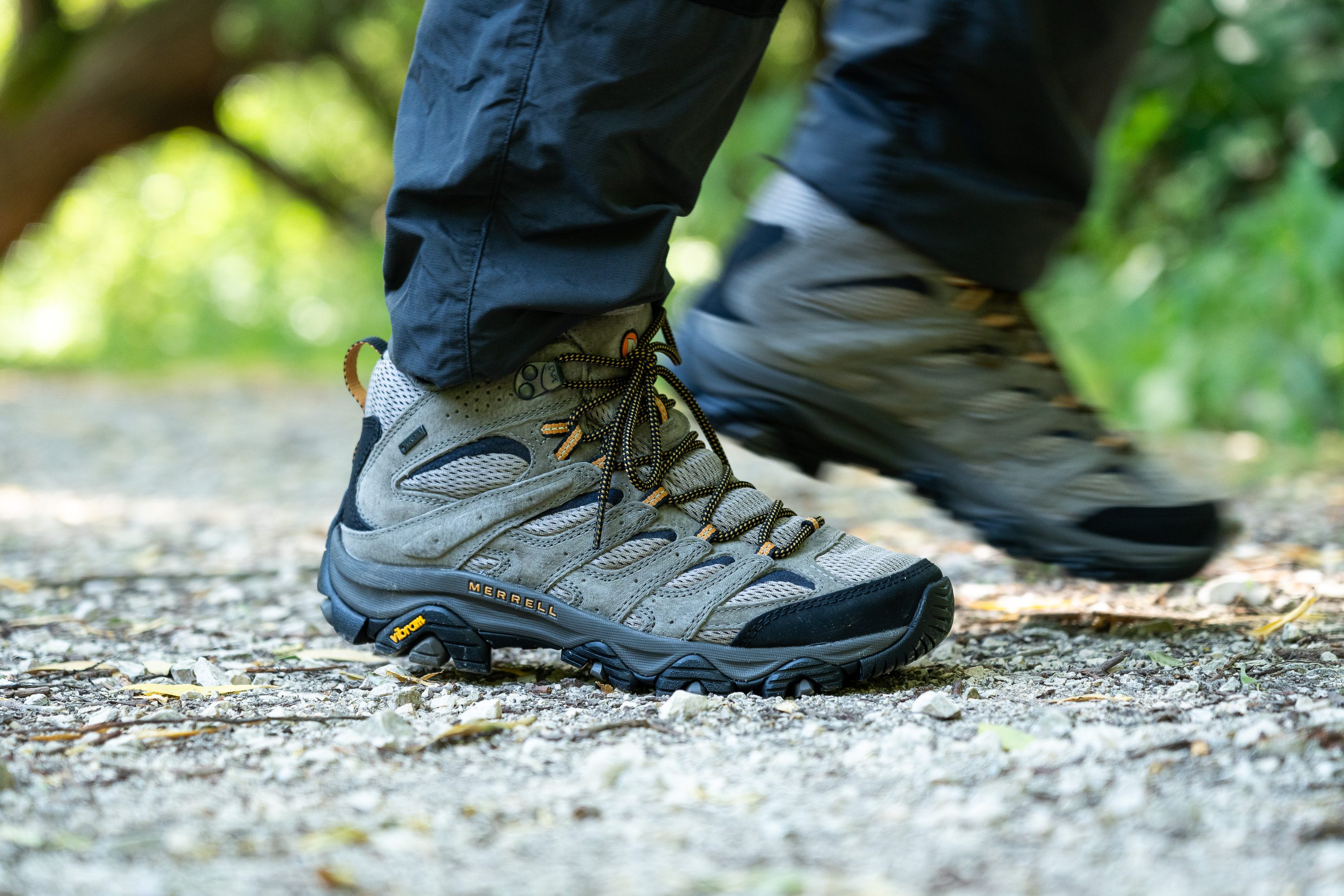
| Moab 3 Mid GTX | 17.5 oz (495g) |
| Average | 18.7 oz (531g) |
Breathability
Since we are reviewing the waterproof GTX (GORE-TEX) version of the Moab 3 Mid, breathability is not to be expected here.
The boot's thick watertight construction didn't let any air pass through the upper, as our smoke-pumping test above shows. Without a flicker of doubt, we gave it the lowest breathability score of 1 out of 5.
Wearing the Moab 3 GTX is not the best idea if you hike in temperatures above 70°F (20°C). Sweaty feet and blisters are guaranteed!
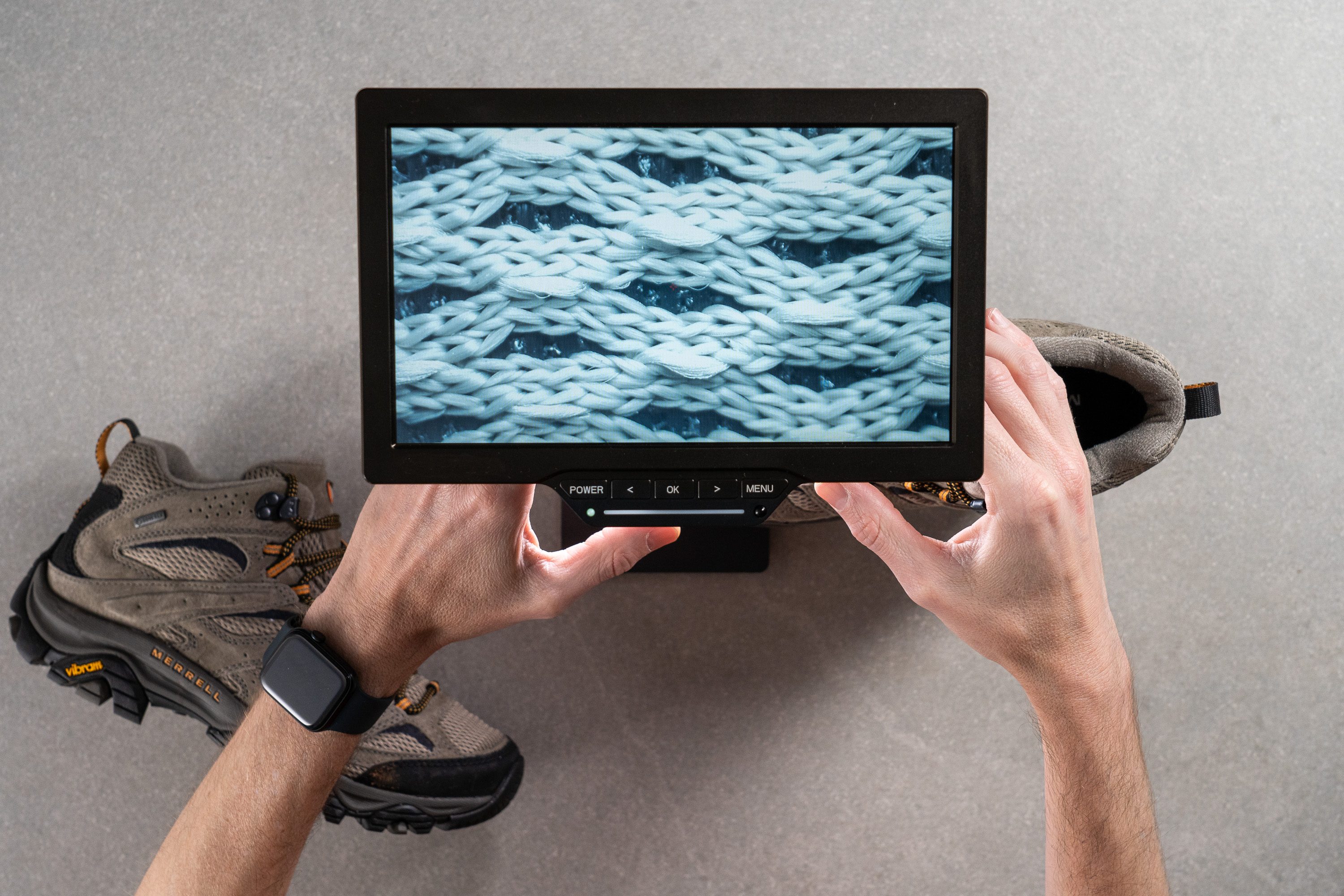
For warmer weather, you should get the non-waterproof version of the boot instead (and it's even £40 cheaper).
| Moab 3 Mid GTX | 1 |
| Average | 1.3 |
Waterproofing
The boot's waterproofing, on the other hand, is stellar! The GTX membrane has been up to the task as we submerged the Moab 3 Mid in ankle-deep puddles and creeks. We can also confirm that this Merrell boot can handle moderate rain, slush, and snow.
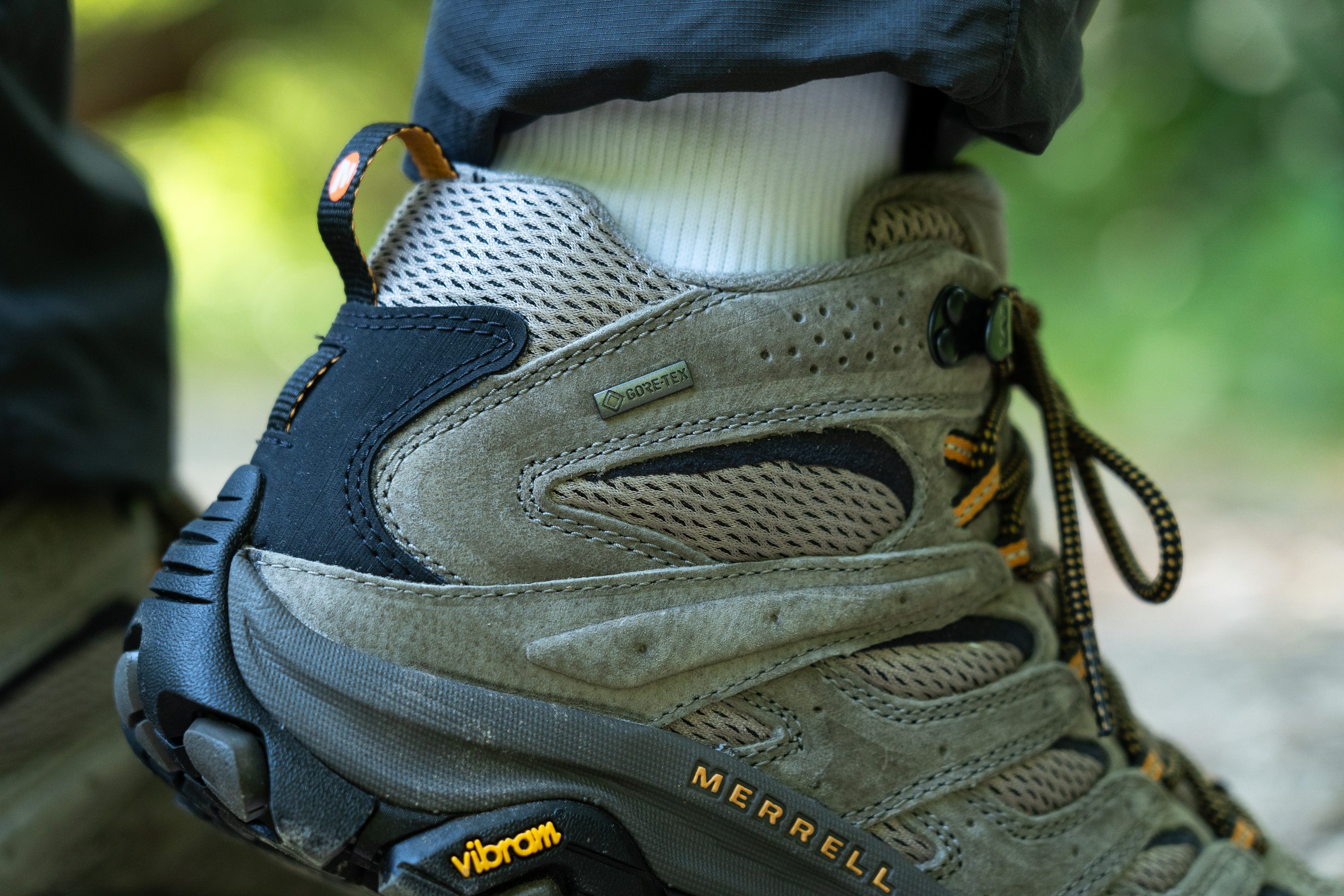
As long as the water doesn't spill over the boot's collar and seep inside the boot, your feet are going to stay dry and warm.
But here is the caveat - once you rip that membrane, the whole boot loses its waterproofing capacity. Does the upper of this Merrell boot have enough wear resistance to prevent that? Let's find out.
Stability
Lateral stability test
For a mid-cut boot intended for moderate hiking conditions, we believe that the Merrell Moab 3 Mid GTX has excellent lateral stability.
Even if you are a beginner hiker with mild overpronation, you will find ample support in this Merrell boot. It may lack the stability needed for multi-day hikes with a heavy backpack but it will keep you covered for a single-day adventure with a medium pack.
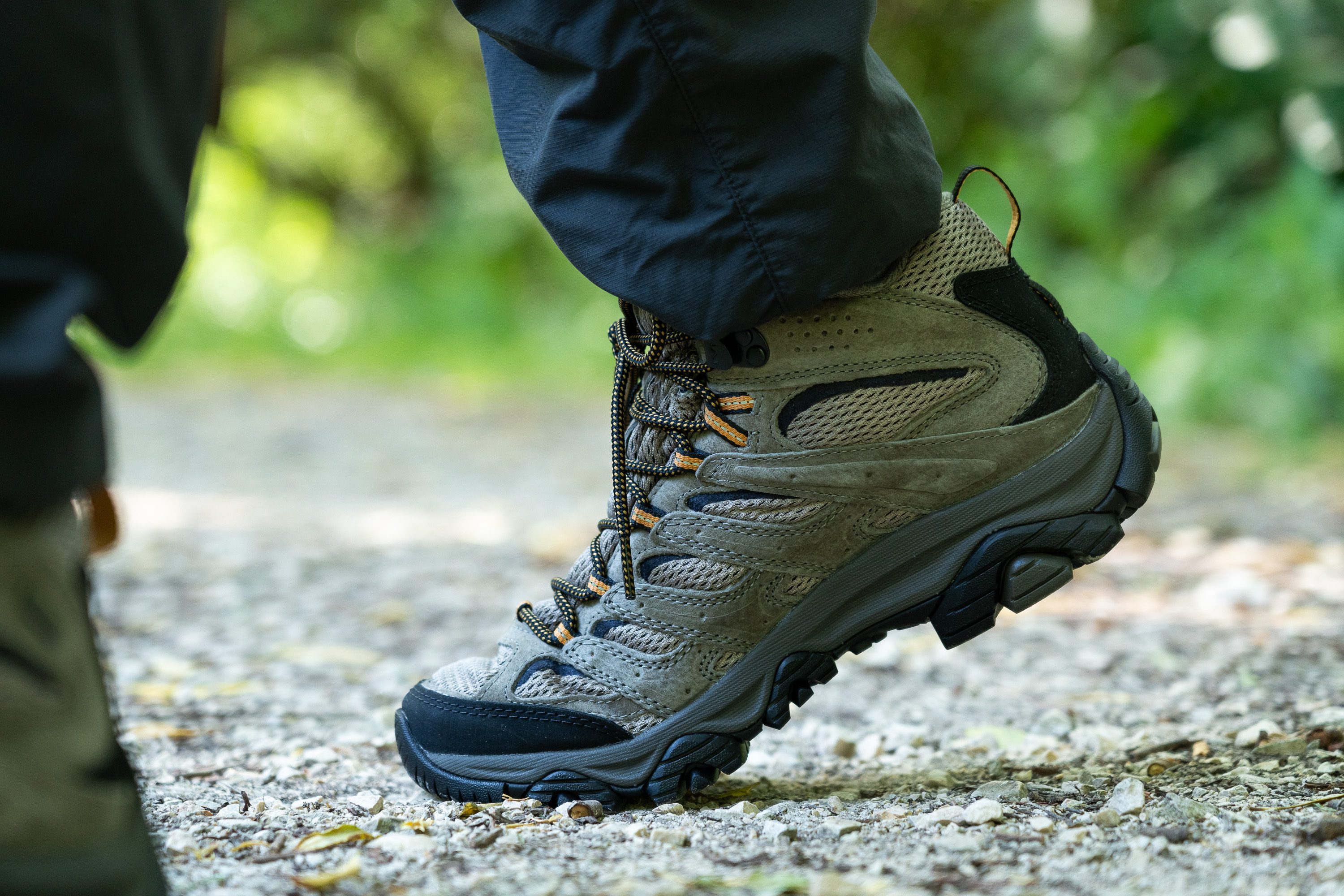
Torsional rigidity
With a stiff nylon shank embedded into its midfoot section, this Merrell boot has a good amount of torsional rigidity to prevent the wearer's ankle from collapsing. We never felt tippy during the wear tests.
When we tried to twist the boot in our manual test, the give was very minimal. Thus, it got a fairly high stiffness score of 4 out of 5.
| Moab 3 Mid GTX | 4 |
| Average | 4.4 |
Heel counter stiffness
Our heels and ankles also felt secure inside the Moab 3 Mid GTX. The boot offers a great deal of ankle support through its raised and well-padded collar as well as the stiff heel counter.
Assessing the latter on a 1-5 scale, we gave it a high score of 4 out of 5.
As you can see, this Merrell boot didn't get the highest possible scores for stiffness but this is what helped it feel a little more comfortable on foot.
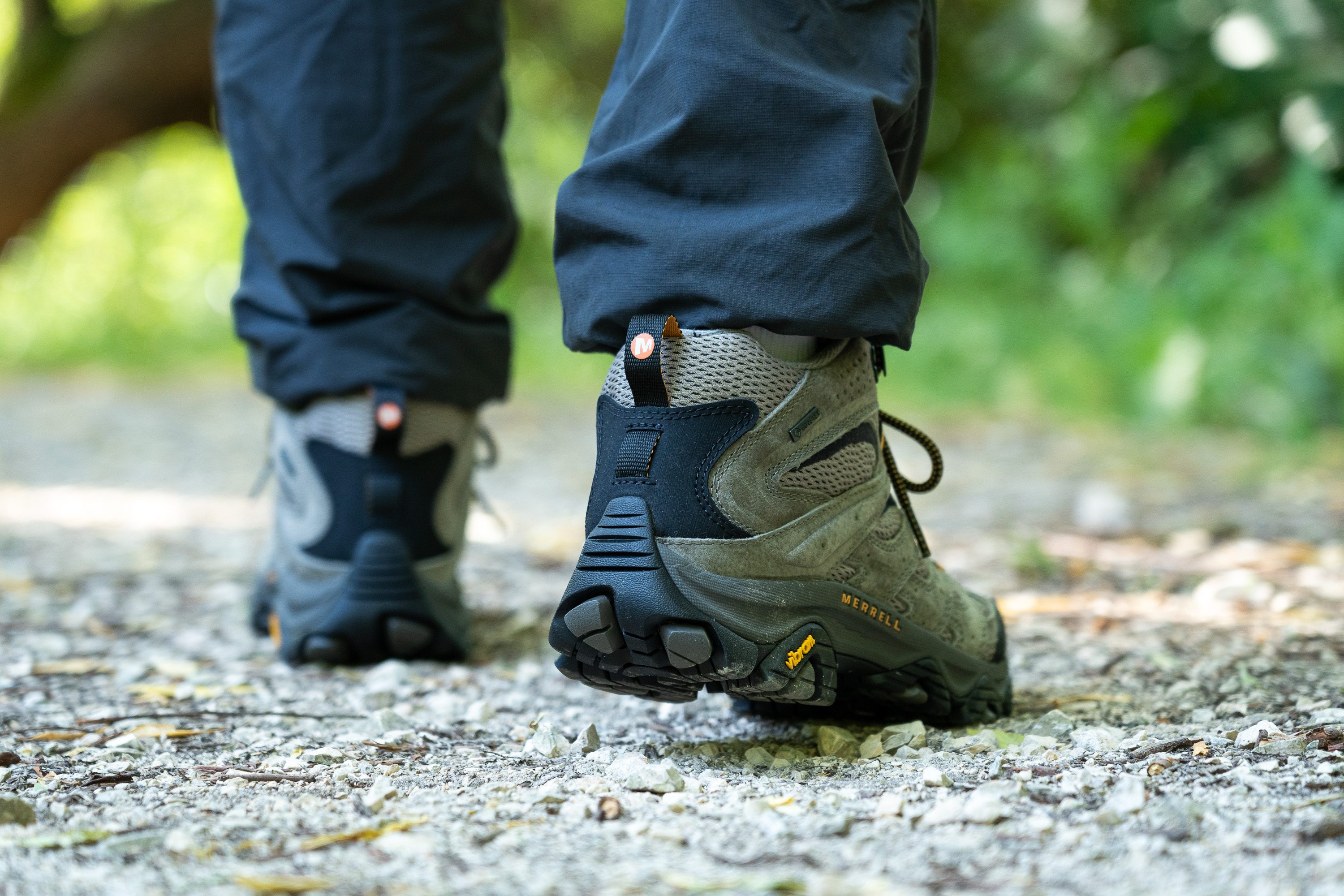
| Moab 3 Mid GTX | 4 |
| Average | 3.6 |
Midsole width - forefoot
Despite its seemingly chunky build, the Merrell Moab 3 Mid GTX has failry average platform dimensions.

Measuring the shoe's midsole in the widest area of the forefoot, we got nothing more than the average reading of 111.9 mm.
| Moab 3 Mid GTX | 111.9 mm |
| Average | 111.5 mm |
Midsole width - heel
The widest part of the boot's heel also showed a standard measurement of 88.8 mm. We believe that this Merrell boot has enough landing area for most hiking scenarios.
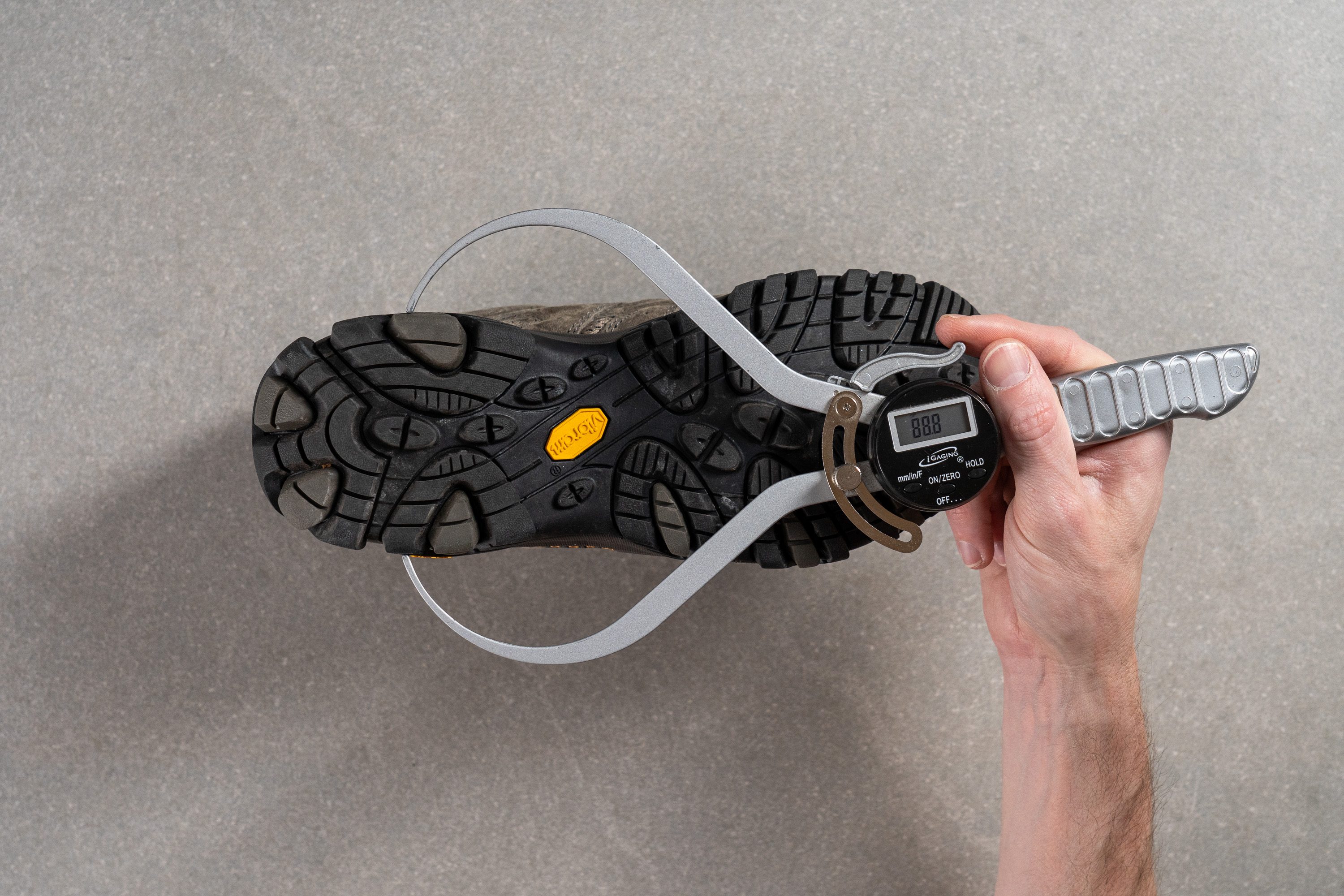
| Moab 3 Mid GTX | 88.8 mm |
| Average | 87.6 mm |
Durability
Toebox durability
Even though the boot features reinforcements all over the upper (rubber toe cap, toe rand, and suede overlays), it still has quite a few areas with exposed mesh. Unfortunately, that material does not stand strong against aggressive wear and tear.
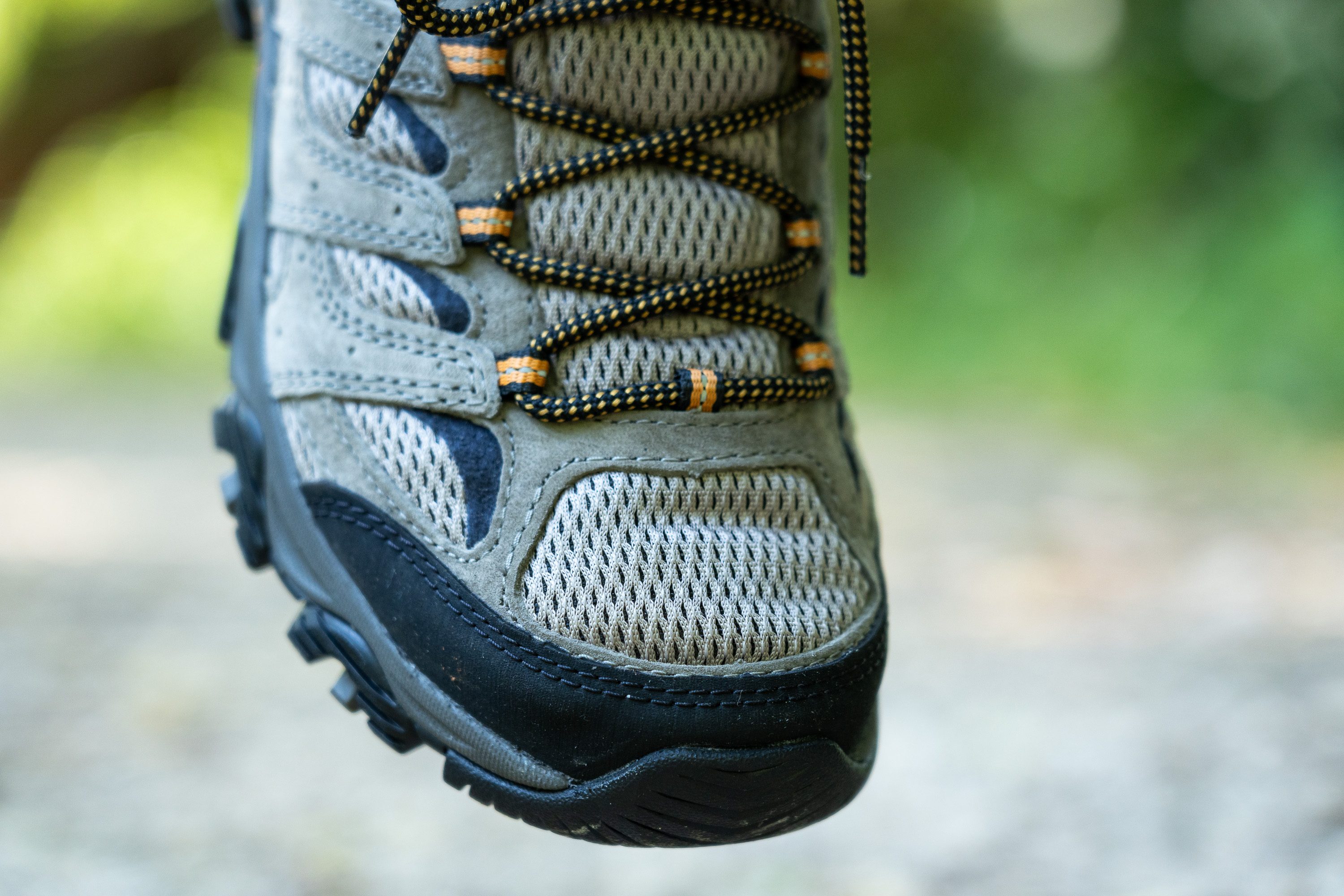
If you frequently slash your boots against rocky ridges or wade through sharp bushes, this textile is going to give up rather quickly.
To mimic the abrasion from hours of trail wear, we applied a Dremel with a sandpaper tip to the shoe's toebox mesh. The speed (5K RPM) and pressure (3.2N) remained consistent. After 12 seconds of exposure, the tool completely burned through the top layer of mesh and notably scratched the inner lining. Unfortunately, waterproofing is no longer guaranteed after this sort of damage.
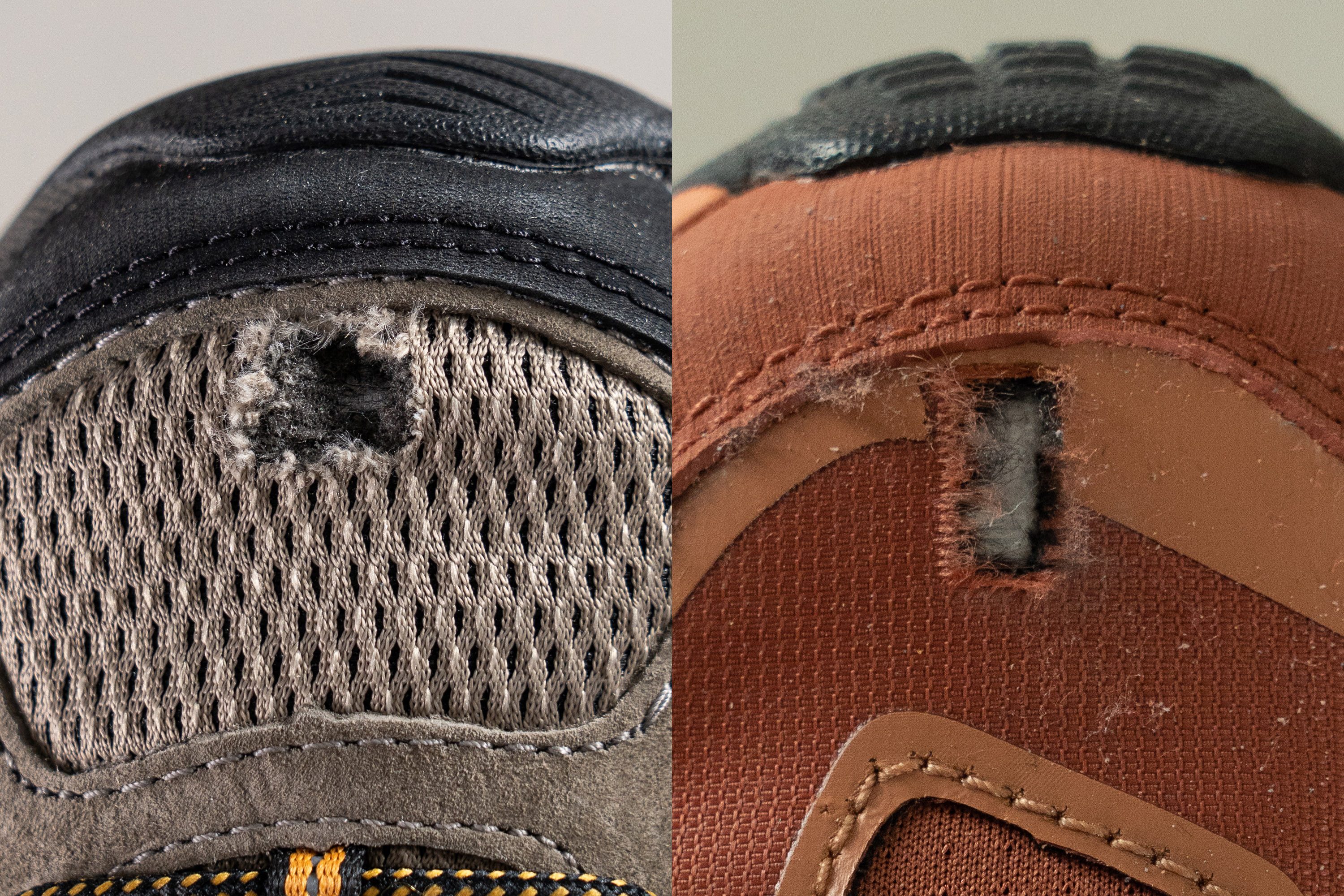
Assessing the toebox durability of the Moab 3 Mid GTX under these conditions, we couldn't rate it any higher than 3 out of 5. This is slightly better than the toebox of the Hoka Anacapa Mid GTX (on the right) where the tool got all the way through the upper material.
If you are worried about tearing your hiking boots too soon, have a look at the Salomon X Ultra 4 Mid GTX. This boot comes from the same price range but the wear resistance of its synthetic upper is on another level.
| Moab 3 Mid GTX | 3 |
| Average | 4.3 |
Heel padding durability
As our next Dremel test shows, the inner lining of the Moab 3 Mid GTX happens to be much more wear-resistant than the boot's outer mesh.
Following 4 seconds of drilling the textile at 5K RPM speed, you can't even tell that this Merrell boot was touched with sandpaper. Even the more expensive Anacapa boot (on the right) faltered in the same test.
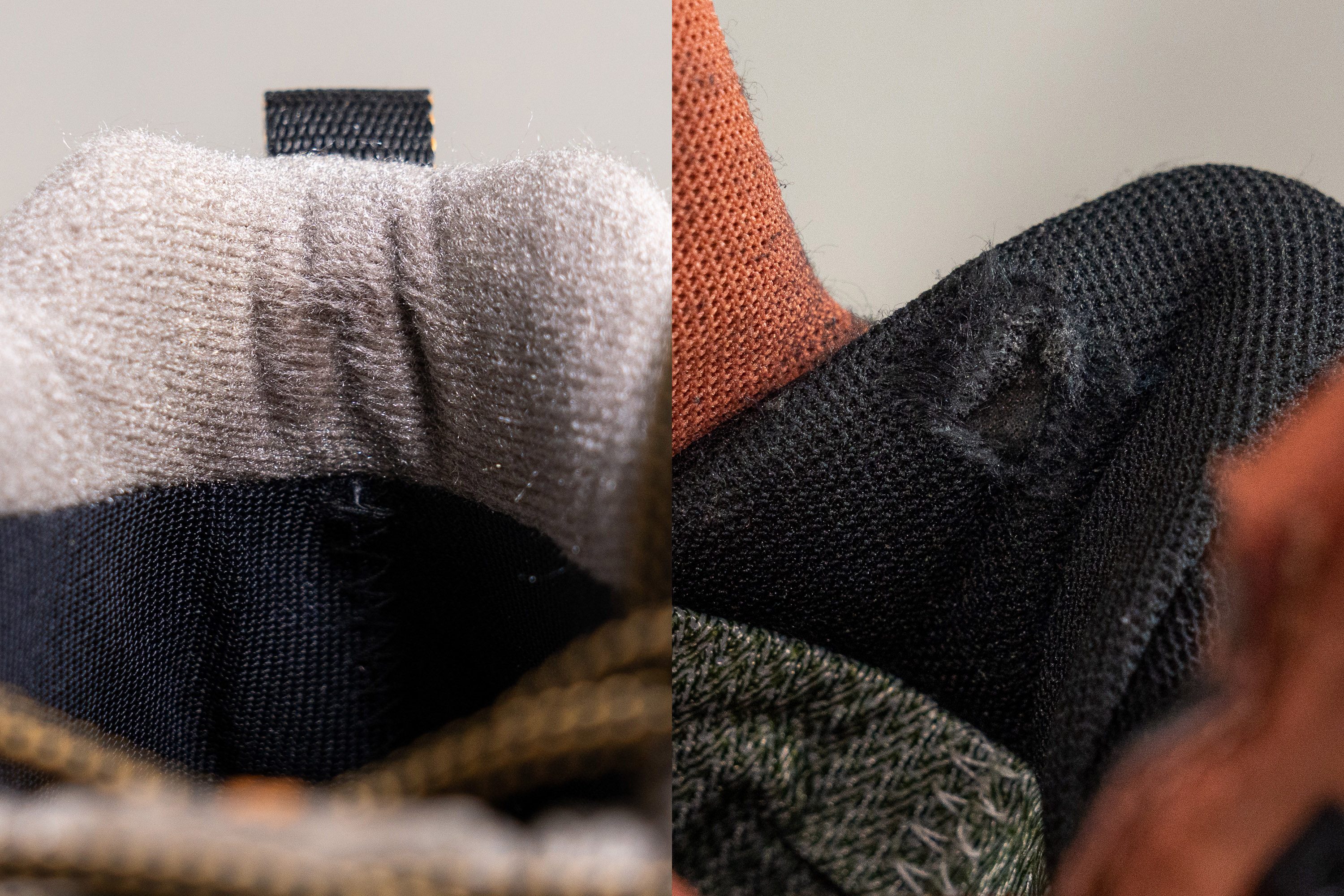
Thus, we proudly rate the boot's heel lining durability with the maximum score - 5 out of 5!
| Moab 3 Mid GTX | 5 |
| Average | 3.6 |
Outsole hardness
If you check our top picks among hiking boots, you will see that nearly every boot features a Vibram rubber outsole. It's like a label of higher quality in the realm of outdoor footwear.
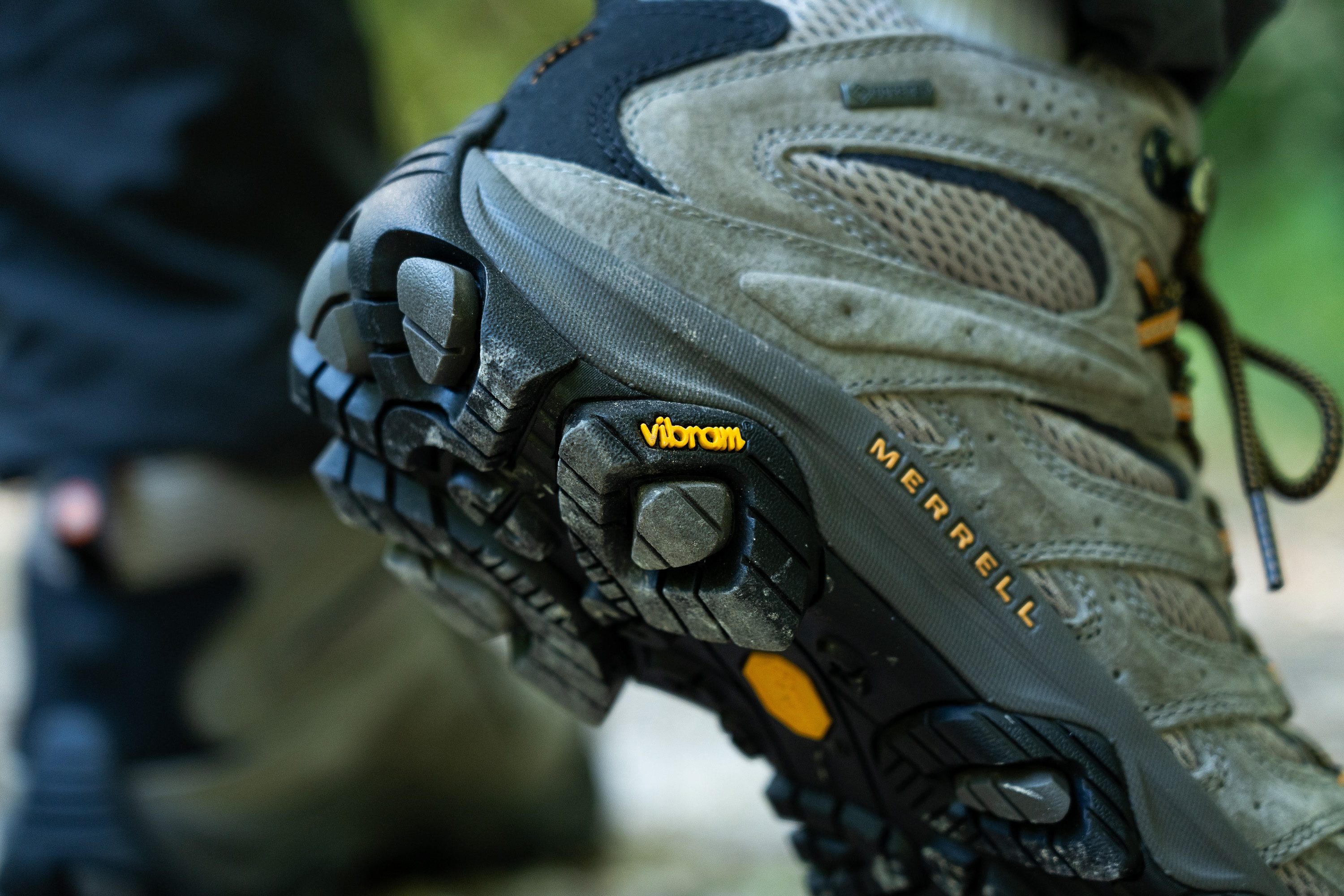
The Merrell Moab 3 Mid GTX also uses Vibram's TC5+ rubber which was exclusively developed for the brand.
Let's see if it meets our high-set expectations.
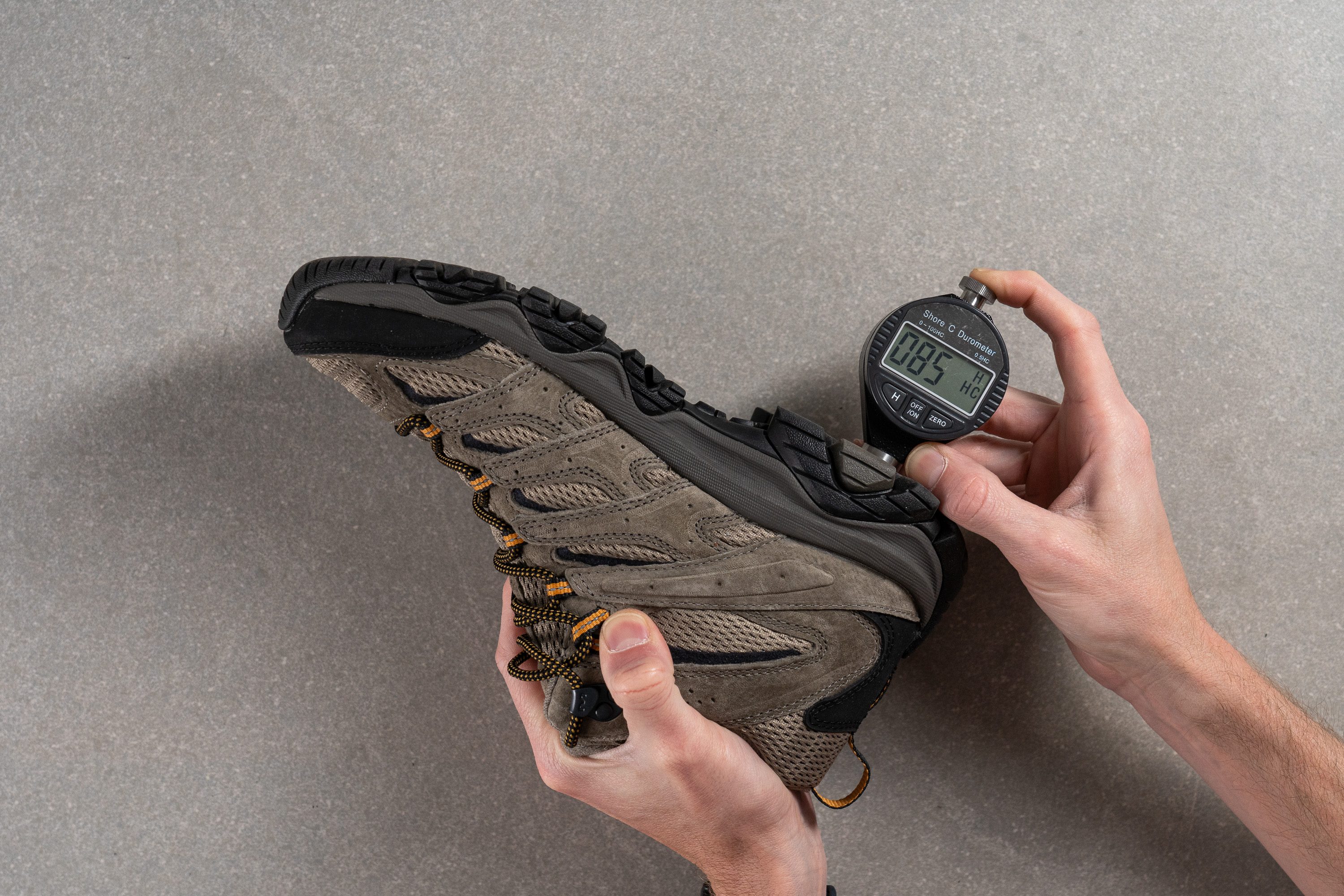
For starters, we checked the hardness of the TC5+ rubber with a Shore C durometer and it showed a solid high reading of 85.0 HC. This is quite reassuring.
| Moab 3 Mid GTX | 84.9 HC |
| Average | 87.1 HC |
Outsole durability
However, when we turned to the Dremel in our abrasion resistance test, we found that the shoe's Vibram rubber was not as special as we had anticipated.
Having drilled the shoe's rubber outsole for 22 seconds at 10K RPM speed, we noticed that the sandpaper carved out a pretty notable dent in the outsole.
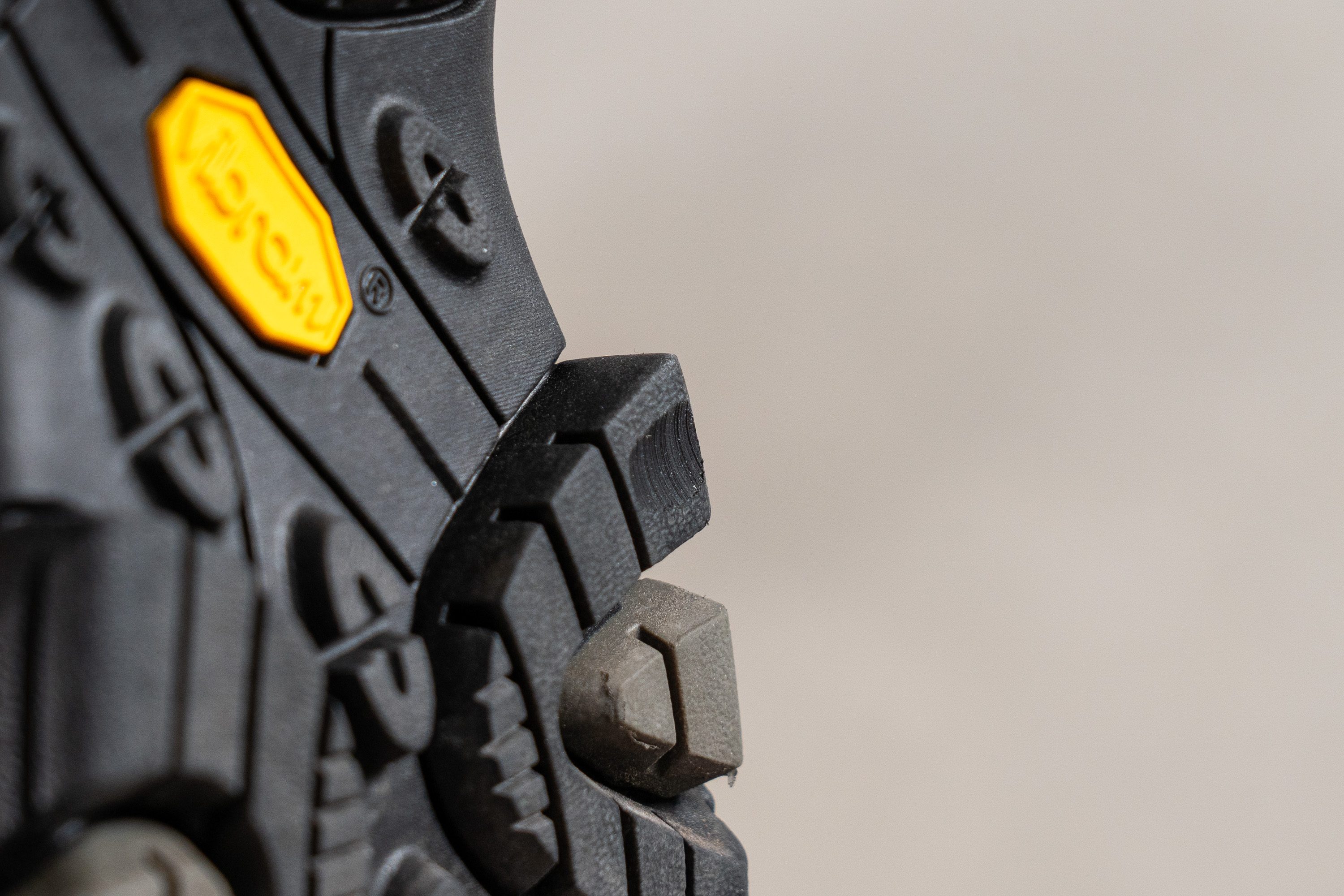
Measuring it with a tread gauge confirmed our observation showing a slightly deeper than average reading of 1.2 mm.
While this is not catastrophic, it makes this Merrell boot less likely to outlast its counterparts when it comes to outsole durability.
| Moab 3 Mid GTX | 1.2 mm |
| Average | 0.8 mm |
Outsole thickness
Gladly, the Moab 3 Mid GTX features a generous amount of rubber in the outsole. This is a huge bonus to its lifespan.
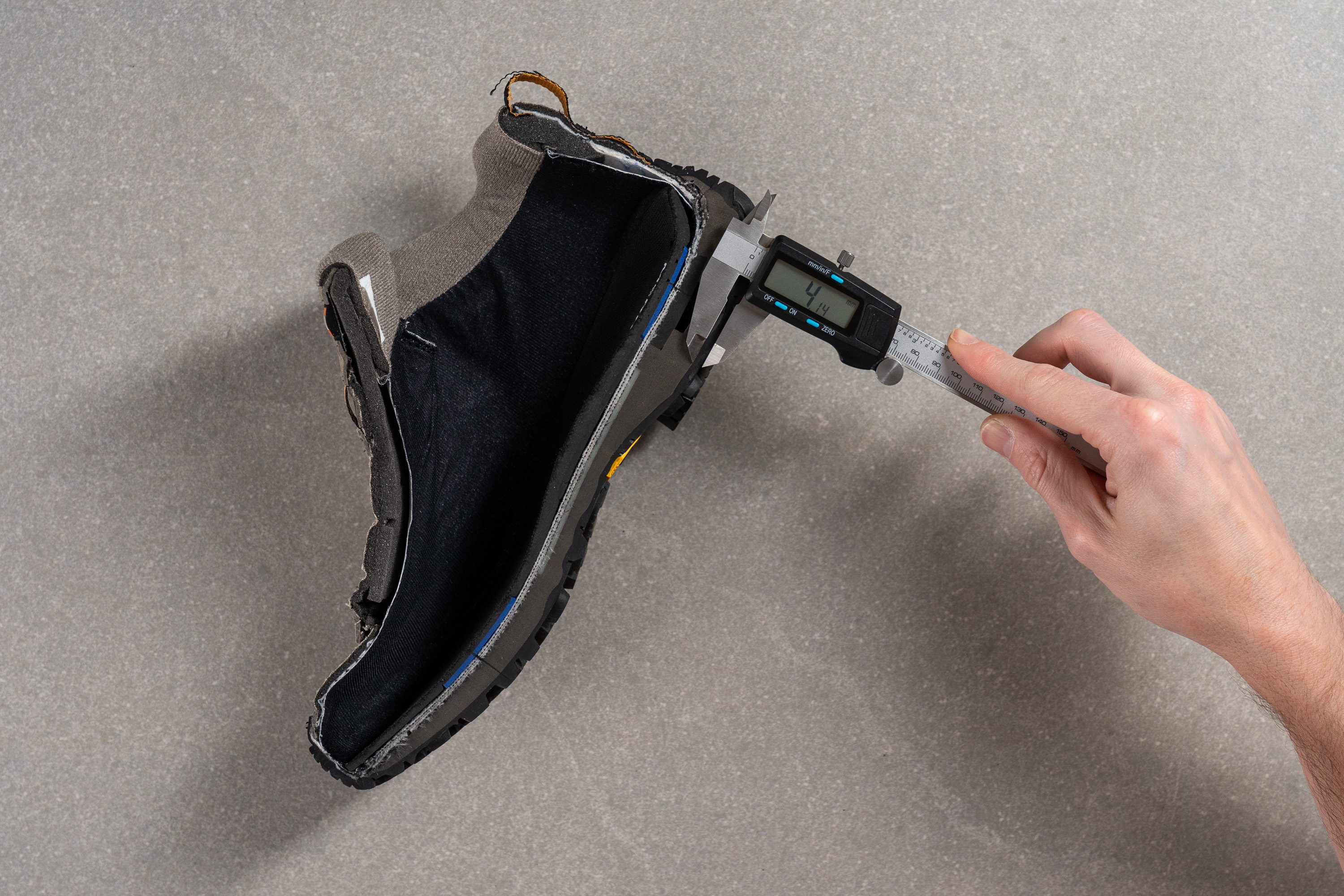
Our calliper measurement shows 4.1 mm which is a millimetre thicker than the average. And the total thickness is even greater if you add 5-mm lugs on top of that.
| Moab 3 Mid GTX | 4.1 mm |
| Average | 2.9 mm |
Misc
Insole thickness
The Moab 3 Mid GTX amplifies underfoot comfort by adding a well-padded insole. We found it to be 6.0 mm thick in the heel which is a typical measurement for hiking boots.
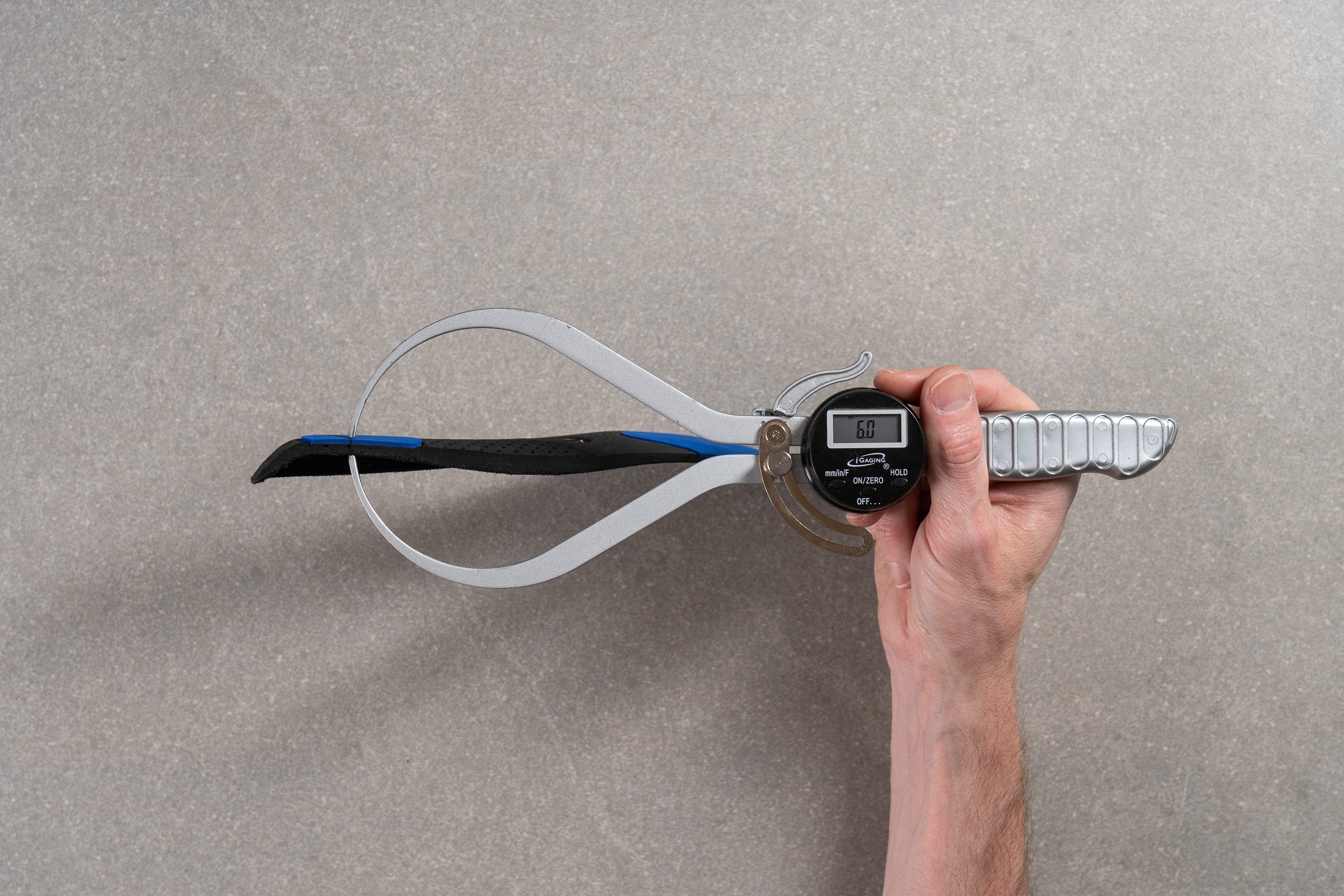
What's more, this insole is also very ergonomically contoured which contributes to the comfort.
| Moab 3 Mid GTX | 6.0 mm |
| Average | 6.0 mm |
Removable insole
Because the boot's insole is easily removable, there is an option to use your own orthotics if needed.
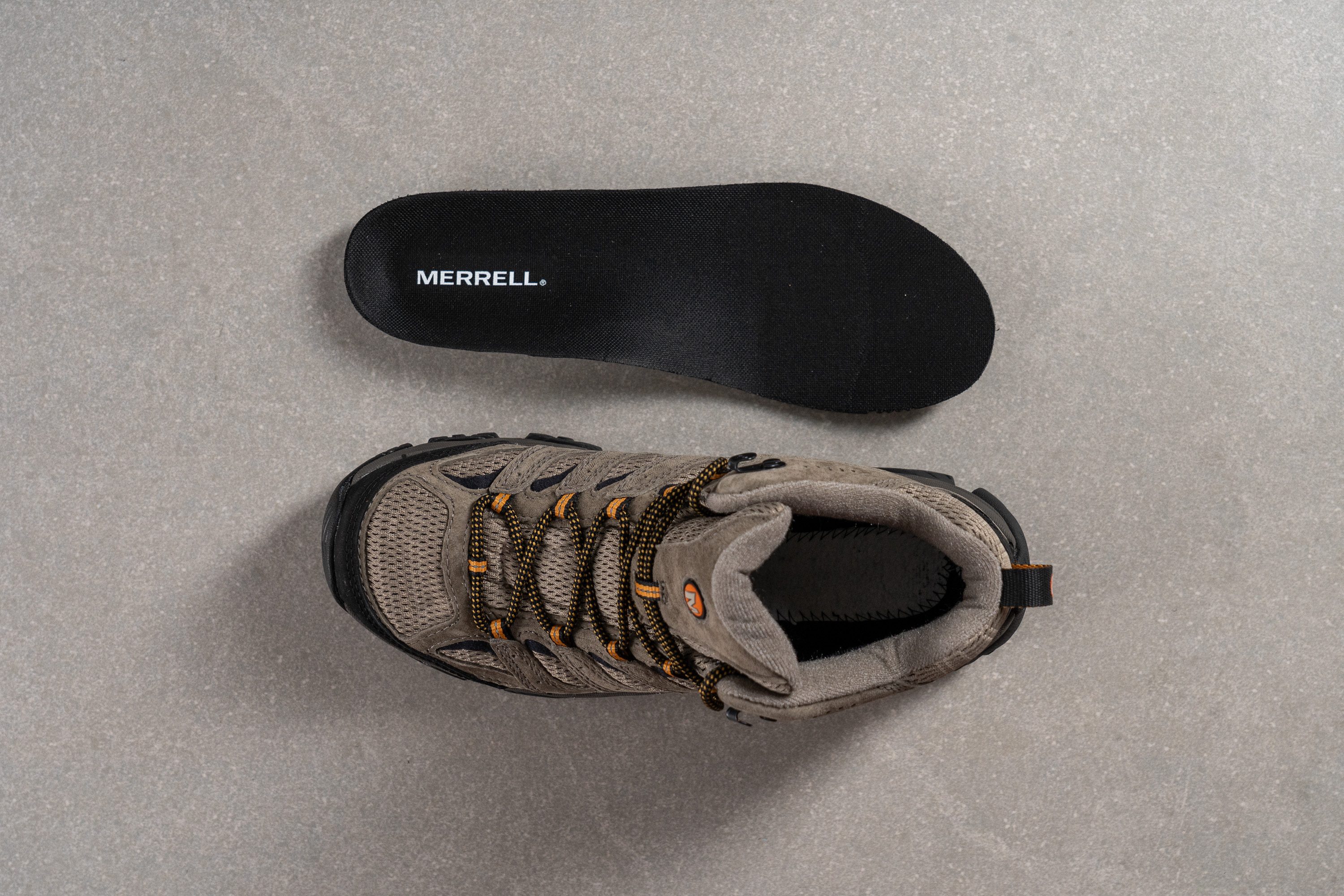
| Moab 3 Mid GTX | Yes |
Midsole softness in cold (%)
Considering the boot's warm and waterproof construction, it only makes sense that it is meant for the colder season. But how does its cushioning behave when the temperatures drop? Let's find out.
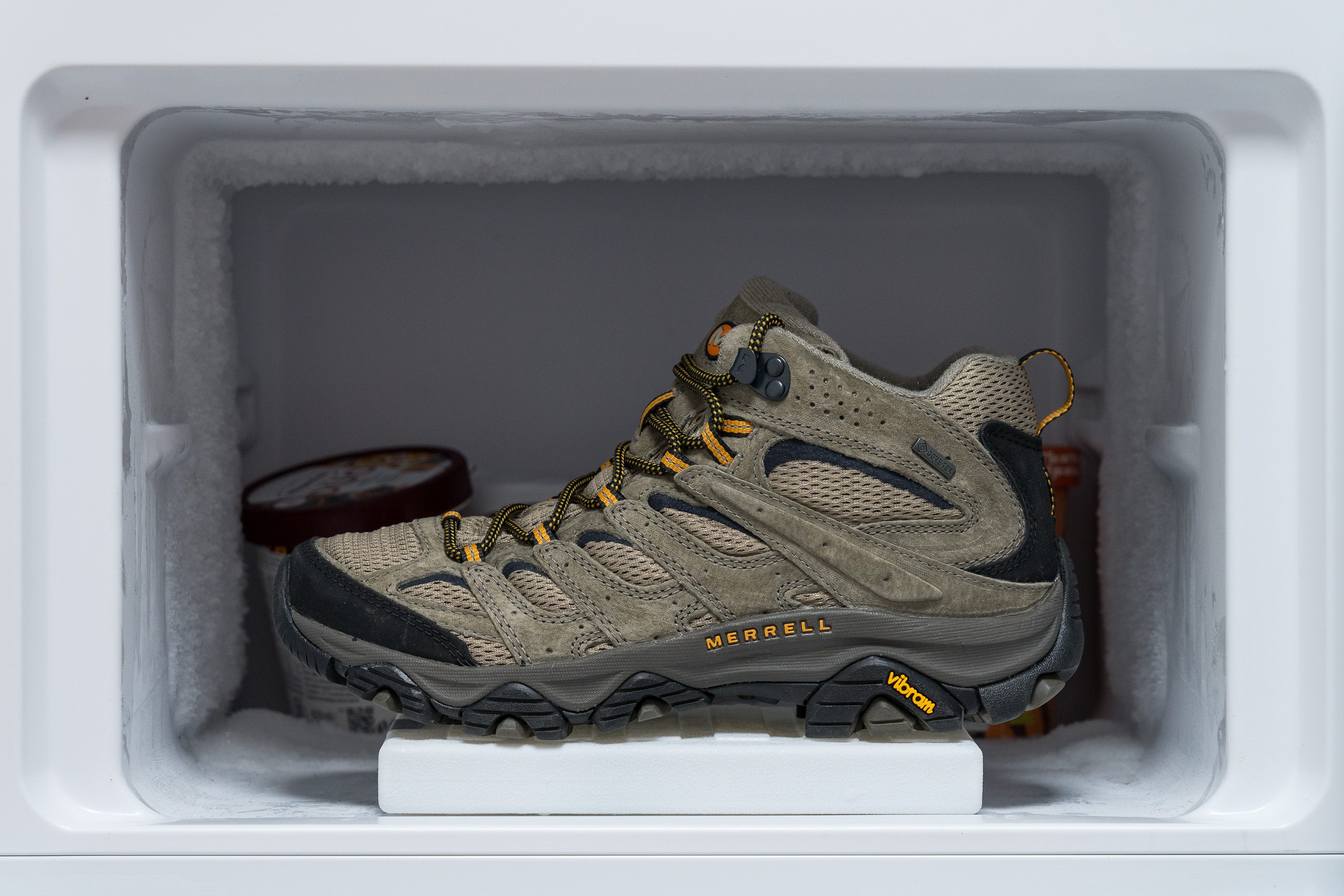
We mimicked winter conditions with the help of a freezer for 20 minutes. After that, we repeated the durometer measurement and discovered that the boot's midsole foam firmed up rather moderately (by 14.5%).
But compared to other hiking boots, it did get pretty firm showing 37.5 HA on the tool.
| Moab 3 Mid GTX | 15% |
| Average | 20% |
Reflective elements
The boot's webbed eyelets have reflective strings on them to help you stay visible in low-light conditions.
| Moab 3 Mid GTX | Yes |
Tongue padding
Comfort has always been a priority in the Merrell Moab boots. And ample padding has been an important component of their cosy step-in feel.
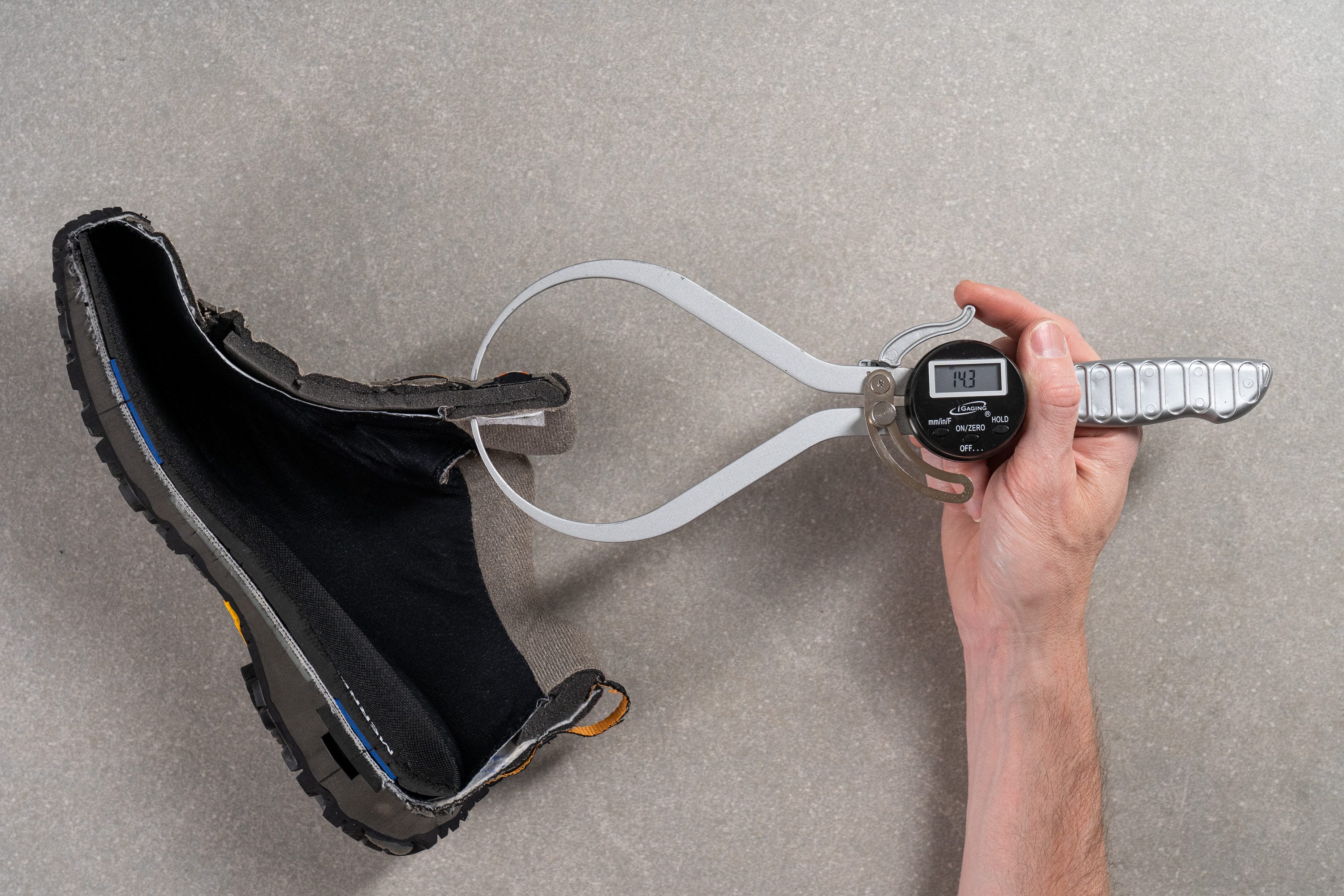
Measuring the boot's tongue thickness, we found that it is a few millimetres thicker than average at 14.3 mm.
An equal amount of padding is also packed around the boot's collar, creating a 360-degree comfort around the foot and ankle.
| Moab 3 Mid GTX | 14.3 mm |
| Average | 11.2 mm |
Tongue: gusset type
The Merrell Moab 3 Mid GTX features a bellows tongue design in which the tongue is fully connected to the boot's upper. This eliminates all gaps in the upper blocking water, dirt, and debris from entering the boot.
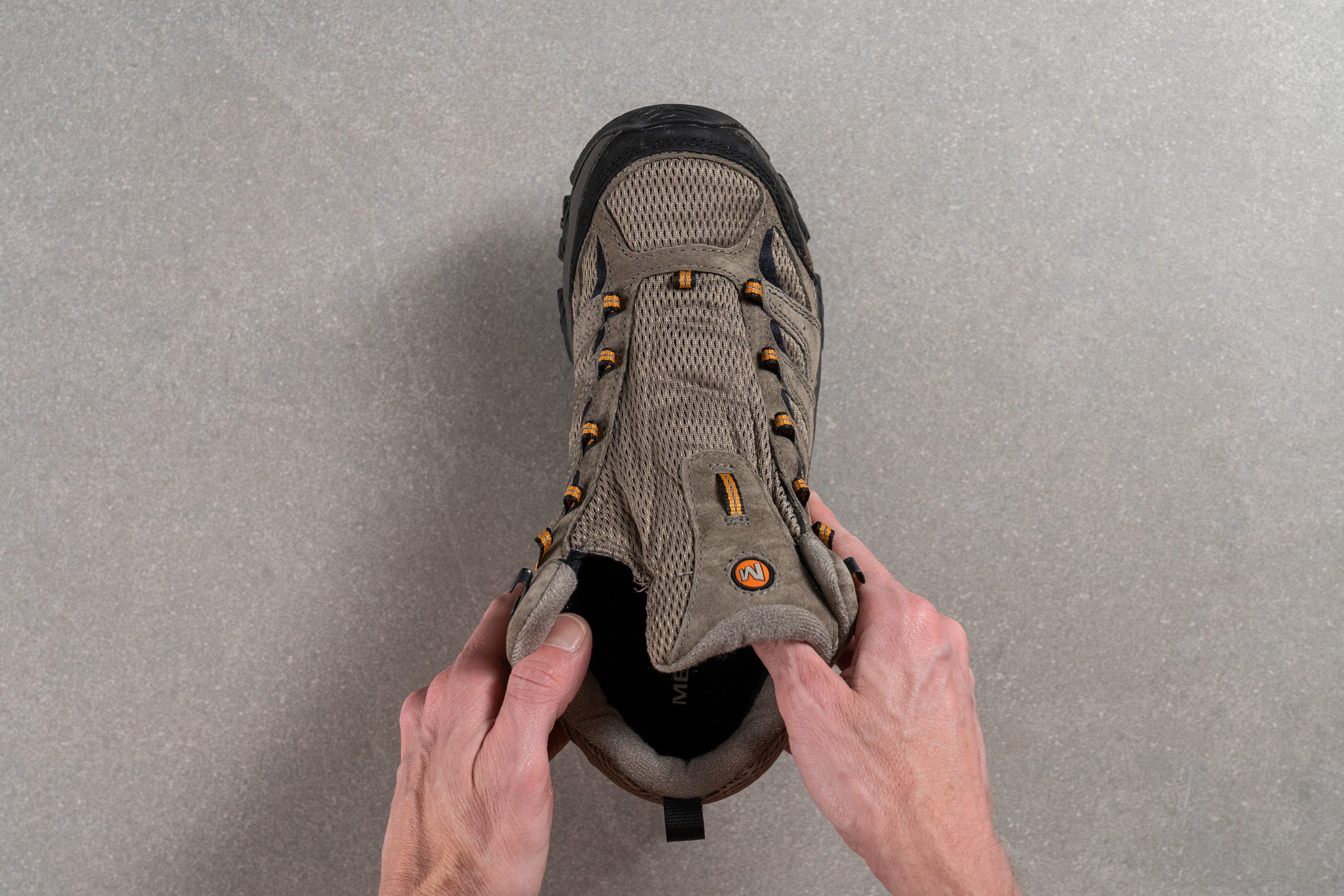
| Moab 3 Mid GTX | Both sides (full) |
Heel tab
A finger loop is attached at the back of the boot for your on-and-off convenience.
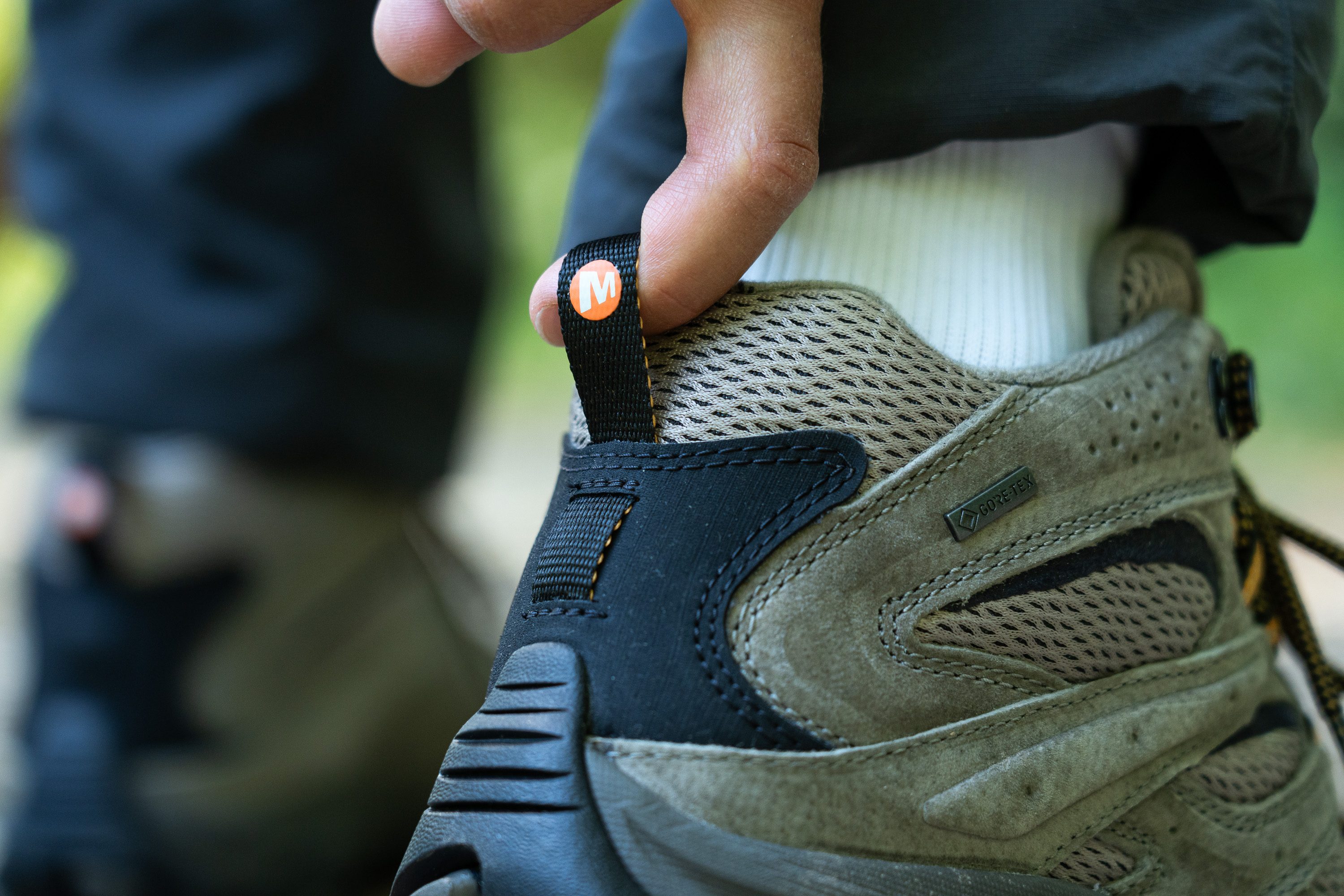
| Moab 3 Mid GTX | Finger loop |
Sustainable materials
Touted as Merrell's most eco-friendly Moab yet, several of the boot's components are made of recycled materials. These include:
- laces
- webbing
- mesh lining
